

Improve Chinese Essay Writing- A Complete How to Guide
- Last updated: June 6, 2019
- Learn Chinese
Writing can reflect a writer’s power of thought and language organization skills. It is critical to master Chinese writing if you want to take your Chinese to the next level. How to write good Chinese essays? The following six steps will improve Chinese essay writing:
Before You Learn to Improve Chinese Essay Writing
Before you can write a good essay in Chinese, you must first be accustomed with Chinese characters. Unlike English letters, Chinese characters are hieroglyphs, and the individual strokes are different from each other. It is important to be comfortable with writing Chinese characters in order to write essays well in Chinese. Make sure to use Chinese essay writing format properly. After that, you will be ready to improve Chinese essay writing.
Increase Your Chinese Words Vocabulary
With approximately 100,000 words in the Chinese language, you will need to learn several thousand words just to know the most common words used. It is essential to learn as many Chinese words as possible if you wish to be a good writer. How can you enlarge your vocabulary? Try to accumulate words by reading daily and monthly. Memory is also very necessary for expanding vocabulary. We should form a good habit of exercising and reciting as more as we can so that to enlarge vocabulary. Remember to use what you have learned when you write in Chinese so that you will continually be progressing in your language-learning efforts.
Acquire Grammar,Sentence Patterns and Function Words
In order to hone your Chinese writing skills , you must learn the grammar and sentence patterns. Grammar involves words, phrases, and the structure of the sentences you form. There are two different categories of Chinese words: functional and lexical. Chinese phrases can be categorized as subject-predicate phrases (SP), verb-object phrases (VO), and co-ordinate phrases (CO). Regarding sentence structure, each Chinese sentence includes predicate, object, subject, and adverbial attributes. In addition, function words play an important role in Chinese semantic understanding, so try to master the Chinese conjunction, such as conjunction、Adverbs、Preposition as much as you can. If you wish to become proficient at writing in Chinese, you must study all of the aspects of grammar mentioned in this section.
Keep a Diary Regularly to Note Down Chinese Words,Chinese Letters
Another thing that will aid you in becoming a better writer is keeping a journal in Chinese. Even if you are not interested in expanding your writing skills, you will find that it is beneficial for many day-to-day tasks, such as completing work reports or composing an email. Journaling on a regular basis will help you form the habit of writing, which will make it feel less like a chore. You may enjoy expressing yourself in various ways by writing; for instance, you might write poetry in your journal. On a more practical side of things, you might prefer to simply use your journal as a way to purposely build your vocabulary .
Persistence in Reading Everyday
In addition to expanding your view of the world and yourself, reading can help you improve your writing. Reading allows you to learn by example; if you read Chinese daily, you will find that it is easier to write in Chinese because you have a greater scope of what you can do with the vocabulary that you’ve learned. Choose one favorite Chinese reading , Read it for an hour or 2,000 words or so in length each day.
Whenever you come across words or phrases in your reading that you don’t understand, take the time to check them in your dictionary and solidify your understanding of them. In your notebook, write the new word or phrase and create an example sentence using that new addition to your vocabulary. If you are unsure how to use it in a sentence, you can simply copy the sample sentence in your dictionary.
Reviewing the new vocabulary word is a good way to improve your memory of it; do this often to become familiar with these new words. The content of reading can be very broad. It can be from novels, or newspapers, and it can be about subjects like economics or psychology. Remember you should read about things you are interested in. After a certain period of accumulation by reading, you will greatly improve your Chinese writing.
Do Essay Writing Exercise on a Variety of Subjects
As the saying goes, “practice makes perfect.” In order to improve your China Essay Writing , you should engage in a variety of writing exercises. For beginners, you should start with basic topics such as your favorite hobby, future plans, favorite vacation spot, or any other topic that you can write about without difficulty.
For example :《我的一天》( Wǒ de yì tiān, my whole day’s life ),《我喜欢的食物》( Wǒ xǐhuan de shíwù, my favorite food ),《一次难忘的旅行》( yí cì nánwàng de lǚxíng, an unforgettable trip ) etc.
Generally the writing topics can be classified into these categories: a recount of an incident,a description of something/someone, a letter, formulate your own opinion on an issue based on some quote or picture etc.
Takeaway to Improve Chinese Essay Writing
Keep an excel spreadsheet of 口语(Kǒuyǔ, spoken Chinese) –书面语(Shūmiànyǔ, written Chinese) pairs and quotes of sentences that you like. You should also be marking up books and articles that you read looking for new ways of expressing ideas. Using Chinese-Chinese dictionaries is really good for learning how to describe things in Chinese.

Online Chinese Tutors
- 1:1 online tutoring
- 100% native professional tutors
- For all levels
- Flexible schedule
- More effective
- Share on Twitter
- Share on Facebook
- Share on LinkedIn
- Share via Email

Qin Chen focuses on teaching Chinese and language acquisition. She is willing to introduce more about Chinese learning ways and skills. Now, she is working as Mandarin teacher at All Mandarin .
You May Also Like

This Post Has 3 Comments
When I used the service of pro essay reviews, I was expecting to have the work which is completely error free and have best quality. I asked them to show me the working samples they have and also their term and condition. They provided me the best samples and i was ready to hire them for my work then.
This is fascinating article, thank you!
Thank you so much for sharing this type of content. That’s really useful for people who want to start learning chinese language. I hope that you will continue sharing your experience.
Leave a Reply Cancel reply
Your email address will not be published. Required fields are marked *

How to Write a Chinese Essay
Dec 16, 2020 | Guest Blogs & Media
The more essays you write, the better you get at communicating with Chinese. To write a good essay, you first have to reach a high language mastery level.
Do you admire the students who write seamless Chinese essay? If you do, then you should know that you too can achieve this level of proficiency. In the meantime, don’t be afraid to pay for your essay if you cannot write it on your own. Online academic writers are a resource each student should take advantage of.
Here are tips to help you get better at writing essays in Chinese.

Learn New Chinese Words
The key to communicating in a new language is learning as many words as you can. Take it upon yourself to learn at least one Chinese word a day. Chinese words are to essay writing what bricks are to a building. The more words you have, the better you get at constructing meaningful sentences.
Case in point, if you’re going to write a Chinese sentence that constitutes ten words, but you don’t know the right way to spell three of those words, your sentence might end up not making sense.
During your Chinese learning experience, words are your arsenal and don’t forget to master the meaning of each word you learn.
Read Chinese Literature
Reading is the most effective way of learning a new language. Remember not to read for the sake of it; find out the meaning of each new word you encounter. When you are an avid reader of Chinese literature, nothing can stop you from writing fluent Chinese.
In the beginning, it might seem like you’re not making any progress, but after a while, you will notice how drastically your writing will change. Receiving information in Chinese helps your brain get accustomed to the language’s sentence patterns, and you can translate this to your essays.
Be extensive in your reading to ensure you get as much as possible out of each article. Remember that it’s not about how fast you finish an article, but rather, how much you gain from the exercise.
Translate Articles from your Native Language to Chinese
Have you ever thought about translating your favorite read to Chinese? This exercise might be tedious, but you will learn a lot from it. The art of translation allows you to seamlessly shift from one language’s sentence pattern into the other. The more you do this, the easier it will be for your brain to convert English sentences into Chinese phrases that people can comprehend.
You can always show your Chinese professor your translations for positive criticism. The more you get corrected, the better you will get at translation. Who knows, you might actually like being a translator once you graduate.
Final Thoughts

by Adrian Lomezzo
Adrian Lomezzo is a freelance writer. Firstly, he has been developing as a content manager and working with different websites, and the main goal of his was to develop the content making it in the first place. Secondly, Adrian had a big desire to help students and adults in self-development in this field and teach them to improve their skills. As a lover of traveling, he did not want to be in one place, and became a writer who could be closer to everyone, and share precious information from the corners of the world.
Submit a Comment Cancel reply
Your email address will not be published. Required fields are marked *
Submit Comment
Other posts you might like

Congratulations That’s Mandarin Winter 2022 Graduates
Mar 31, 2022 | Beijing , News
We’re so excited and proud to see our students achieve goals and improve their Chinese skills at That’s Mandarin. We know how hardworking and diligent you are and we are happy to go through this incredible and at times difficult process of learning Chinese together...

News: NihaoKids Website Is Live!
Mar 3, 2022 | News , Online
A modern place for your children to learn Mandarin Chinese.

Mahjong Night Recap (Feb 23)
Feb 24, 2022 | Beijing , News , Shanghai
The best moments of Mahjong Night!
Get 2-week FREE Chinese Classes
Original Price: ¥ 600

- U.S.& Canada: 1-800-791-9386
- Hong Kong: 800-902-058
- Australia: 1-800-779-835
- Singapore: 800-852-6935
- United Kingdom: 0-800-086-8969
- France: 0-805-080-689
- Germany: 0-800-180-0341
- Spain: 900-838-906

- Regular Chinese Lessons for Adults
- Survival Chinese Lessons
- Daily Chinese Lessons
- Business Chinese Lessons
- Survival Business Mandarin
- HSK Test Prep Course
- HSKK Test Prep Course
- Chinese Culture Lessons
- Industry-Specific Chinese Lessons
- Chinese Lessons for Job Interviews
- Chinese Business Etiquette
- Travel Chinese Lessons
- Chinese Lessons for Finance
- Medical Chinese Lessons
- Learn Chinese through Songs
- Chinese Lessons for Dating
- Chinese Lessons for International Trade
- Customized Chinese Classes for Adults
- Chinese Reading Course (Newspaper, Magazines and Internet)
- Learn Chinese through Movies and TV Programs
- C.TEST (Test of Practical Chinese) Prep Course
- BCT (Business Chinese Test) Prep Course
- Regular Chinese Lessons for Teens
- Chinese Lessons for Adoptive Families
- AP Chinese Lessons and Test Prep
- IB Chinese Tutorial Course
- SAT Ⅱ Chinese Test Preparation Course
- GCSE/IGCSE Chinese Lessons and Test Prep
- Chinese Courses for VCE Examinees
- YCT Writing Test Prep Course
- YCT Speaking Test Prep Course
- Learn Chinese through Cartoons, Movies and TV Programs
- Chinese Lessons for Heritage Learners
- Customized Chinese Lessons for Teens
- For Parents
- Regular Chinese Lessons for Kids
- Learn Chinese through Cartoons
- Customized Chinese Lessons for Kids
- Summer Chinese Program
- Solutions for Educational Institutions
- Corporate Training
- Chinese Immersion Program
- Free Assessment
- Our Students
- Teaching Method
- Certificates
- Partnerships
- How It Works
- Media Coverage
- Ask Jennifer
- Testimonials
- Third-Party Reviews for eChineseLearning
- "Family and Friends" Referral Program
- Test Prep Courses
- Videos by Students and Teachers
- Mandarin Resources
- Affiliate Program
- Chinese Input Method
- Email Inquiries: [email protected]
- Skype: service_eChineseLearning
- WeChat: eChineseLearningAC2

- Download eChineseLearning App

How to Become a Rockstar Chinese Writer

The importance of learning Chinese writing
Nowadays more and more people are beginning to learn Chinese. For the most part, they are only focusing on learning how to speak Chinese. But concerning using this language, they also need to learn Chinese writing. Writing can reflect a writer’s power of thought and language organization skills. It is critical to master Chinese writing if you want to take your Chinese to the next level.
How to write good Chinese essays? The following five steps will improve your Chinese writing.
Become familiar with the Chinese Character Writing
In order to write a good Chinese essay, a fundamental step is to be familiar with Chinese characters. Chinese characters are different when you compare them to English letters. Chinese characters are hieroglyphs and each stroke of a Chinese character is different from the next stroke. Familiarity of Chinese character writing is indispensable for anyone who wants to write nice Chinese essays.
Increase Your Vocabulary
The Chinese language includes 100,000 vocabulary words. If you want to just know the most used words you still need to learn several thousand words. A good writer needs to acquire as many words as possible. How can you enlarge your vocabulary? The best method is to listen, read and learn as much Chinese as possible. Don’t forget to apply what you have learned to your Chinese writing so that you can make continual progress.
Acquire Grammar and Sentence Patterns
Chinese grammar and sentence patterns need to be acquired in order to improve your Chinese writing. Generally speaking, grammar consists of words, phrases and sentence structure. In terms of single words, Chinese words can be classified as lexical and functional words. In terms of phrases, Chinese phrases can be divided into CO (co-ordinate phrases), SP (subject-predicate phrases), and VO (verb-object phrases). In terms of sentence patterns, a Chinese sentence includes subject, predicate, object, adverbial, attribute and complementary. All of the above grammar points are necessary to study if you want to learn how to write in Chinese.
Persistence in Reading Everyday
Reading can broaden one’s horizon, and it can aid their writing. Reading everyday is a great way to help people learn how to have good Chinese writing ability. The content of reading can be very broad. It can be from novels, or newspapers, and it can be about subjects like economics or psychology. Remember you should read about things you are interested in. After a certain period of accumulation by reading, you will greatly improve your Chinese writing.
Do Writing Exercise on a Variety of Subjects
Practice makes perfect. Apply this proverb in Chinese writing. You need to do a lot of writing exercises to make your Chinese writing excellent. It has been suggested to begin with simple subjects, like personal hobbies, future dreams or anything else that can be understood easily. Students with more experience can write about more complicated topics like economics, politics and society. You should consider all these aspects, because doing writing exercise on a variety of subjects can help improve a person’s writing ability.
General Chinese (Beginner Level) General Chinese (Intermediate Level)
Related Posts
Chinese character: 春 (chūn) spring (beginner), quote of the week (feb. 10, 2010), 中国工人入选时代周刊 chinese worker selected as time magazine’s “person of the year”, video lesson: 购物 (gòuwù) shopping (beginner), answer to chinese terms of endearment: who is your “爱人(àiren)”, 富有的乞丐 (fùyǒu de qǐgài) a rich beggar (intermediate), top 7 ways for making self-introduction in chinese, must know chinese internet slang (elementary), benefits of studying chinese, chinese characters (beginner), 4 thoughts on “how to become a rockstar chinese writer”.
should add some pictures to make it interesting!
Hi Deynika. Thanks for your advice, we will try to add some interesting pictures in our posts.
I love chinese writing and it is a lot interesting. Can you send a list of chinese words to improve vocabulary? Thanks
You can check out our blog, it introduces many interesting words, slang and useful expressions. In addition, we offer many video lessons to help you improve vocabulary. Hope it will help.
Leave a Comment Cancel Reply
Your email address will not be published. Required fields are marked *
Save my name, email, and website in this browser for the next time I comment.

Grammar , Vocabulary
Useful Chinese Essay Phrases
July 8, 2020
By Ellen

Nowadays, many international students have decided to study abroad, and China has become a highly popular destination. In universities, essay writing is a basic skill and the “Academic Writing” lectures are always attracting many students to attend.
Here we have summarized some “all-purpose” phrases and sentences which hopefully you would find useful.
Chinese Essay Phrases Used in Abstracts
The abstract should explain the purpose, method, results, and conclusion of your research, also highlighting the new ideas that you proposed; and do remember to keep your language concise while writing. The purpose of the abstract is to conclude and summarize the main contents of your essay so that the reader could have a brief understanding without having to read the entire paper. Chinese abstracts are usually around 200 characters.
Research Background, Significance, and Current Situation
Extremely useful/badly needed/affecting people’s lives (1-2 sentences)
Proposing the Object of Study
Played a very important role (1-2 sentences)
Purpose of the Study or Study Aim
The role of A in B, perhaps remains to be seen (1 sentence)
Research Methods and Results
Through what means/technique/experiment we achieved what result (several sentences)
Research Results
The phenomenon of A in B, shows what the function of B is, theoretical and applied value (1-2 sentences)

via Pixabay
Chinese Essay Phrases: Main Body
The main body includes the introduction and the main text. The introduction section could use similar phrases that we have just listed, focusing on research objects and purposes. The main text should include research methods, research results, and discussion. Writers should keep their sentences to the point and avoid rambling, also avoid using too much subjective perspective discourses, which shouldn’t be used as arguments as well.
Theoretical Basis, Approaches, and Methods
To express opinions, to emphasis, transitional expressions, chinese essay phrases: conclusion.
At the ending section of the paper, the writer should provide an objective summary, list out the future research objectives and directions, and perhaps look into the future. Keep optimistic even if your experiment results were negative.
Research Impact and Value
There you go. We hope this article helps you write amazing essays. Best of luck!
Ellen is a language specialist from China. She grew up in the US and received a master’s degree from the St Andrews University of UK. The multicultural experiences attributes to her understanding of the differences and similarities between the English and Chinese language. She currently works as an editor specialized in Language learning books.
related posts:
Must-Try Authentic Chinese Dishes
15 must-watch chinese movies for language learners, best chinese music playlists on spotify, get in touch.
Hacking Chinese
A better way of learning mandarin, 20 tips and tricks to improve your chinese writing ability.

Image from The Simpsons S13E4: A Hunka Hunka Burns in Love.
Writing is an important part of learning Chinese. The written word allows us to communicate online, record our thoughts and opinions and share them with others.
Writing is also an important part of many professional applications of learning Chinese, such as communication with colleagues, partners or clients. Finally, writing is also a part of many proficiency tests.
Writing in Chinese is different compared with most other languages in that there is a dual challenge learning both to write characters and to compose text. These are two completely different skills.
In this article, I will focus on composing text. For more about learning to write characters, please read this article: My best advice on how to learn Chinese characters .
My best advice on how to learn Chinese characters
Writing as a process rather than a product
Many students and teachers treat writing as a product, putting emphasis on the text itself. This effect is often enhanced by setting a grade on a writing assignment and then moving on to the next unit.
Writing is better viewed as a process, where what you write is just a milestone on your journey towards better writing ability. This usually means that you write fewer texts, but that you work more with each one. The goal is learning, after all, not writing a certain number of characters.
It should come as no surprise that I like writing; I have spent many thousands of hours writing in a foreign language (a lot of English, much Chinese and almost no French). Naturally, this website is in English, but isn’t called “Hacking English”, so I will focus on Chinese here. I have actually published a few articles in Chinese here as well, this one about using adventure text games being the most recent one . The advice in this article is based on my own experience with writing in foreign languages, as well as reading and research into second language writing.
I have divided the writing process into three phases:
- Before writing
- During writing
- After writing
How to improve your Chinese writing ability: Before writing
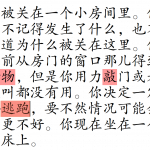
- Familiarise yourself with text type and genre – When reading, pay attention to the genre and how it works, A formal email, a shopping list and a doctoral dissertation are very different types of texts. A few questions to ask yourself are: What function does the text serve? Are there any formal characteristics of this type of text in Chinese? How is information organised in this type of text? The answers can be different in Chinese compared with your native language. For example, writing emails is very different in different languages when it comes to how to start, end and so on. Sometimes you can find information about this online as well, so it can be worth studying a bit. I actually asked a question about this on Stack Exchange back in 2012.
- Write about topics you care about – When choosing what to write, the most important consideration is what you want to communicate to others. Writing requires concentration and effort, which is harder to muster if you feel the task is boring or meaningless. We all like different things, so it’s hard to give general advice, but topics related to your own life, your experiences and opinions are good places to start. A journal or diary is great because it provides a never-ending sequence of events to write about! If you find it hard to come up with topics, here are some suggestions: 50 Questions That Will Free Your Mind , 49 ESL Writing Topics , the Book of Questions .
- Keep it on the write level – While you should write about things you care about, keep it realistic. As a rule of thumb, do not try to write about things you are not already reading about with some confidence and fluency. Don’t write about spaceflight if you’re not already comfortable reading about it in Chinese; stay away from writing fiction heavy on descriptions of places and events if you’re not reading such stories a already. I’ve done my fair share of writing beyond my level and it’s not worth it. You will spend many times longer on each text, but you don’t learn more. As I said before, writing is the result of learning, not the cause of it.
How to improve your Chinese writing ability: During writing
- Organise your thoughts by writing a simple outline – When it comes to writing clearly, much of the thought-process is the same no matter what language you’re writing in. It’s hard to write coherent and easy-to-read text even in your native language if you yourself only figure out what you want to say as you go along. Needless to say, it’s even harder in a foreign language! Write a simple outline before you start. This can be a handful of bullet points.
- Write a full draft, then polish – Inexperienced writers often get stuck in details immediately. What should the title be? How should it be worded? Does A make a better title than B? These things will emerge later. Instead of focusing on details from the start, write a draft first. This version is probably quite bad, relatively speaking, but fortunately, you don’t need to show this to anyone! Once you have a draft, you can go through the text again and take care of those details you skipped earlier. Choosing a title is easier after you have a draft, for example. Now that you know what the whole text is like in general, it will be much easier to work with and you also don’t feel stupid after spending one hour and having only written two sentences.

- Don’t make your text more complicated than you have to – Some students (including my past self) try to write more advanced Chinese than they can handle, thinking that throwing in more advanced words will impress people ( chengyu is a good example of this ). This almost never works and is generally a bad idea. Your goal should be to use to write as clearly as possible, using language you already know. This is also what the receiver will care about. Even on a proficiency exam, using difficult words just for the sake of it will not raise your score, especially if you use them incorrectly. Advanced readers are also very sensitive to uneven writing, so if your level is at the lower-intermediate, occasionally throwing in very hard words will just show that you used a dictionary and don’t really know what you’re doing. Teachers of all languages can testify to how easy it is to see through this, even if students (especially kids) are baffled by how easy the teacher can tell.

- Use double translation if you want to be sure you’ve found the right word – This is when you look up a word in Chinese, then feed the result back to the dictionary and translate back to your native language. If the result seems reasonable, it’s probably the word you’re looking for. Let’s say you want to translate “beam”, as in “beam of light”. You look it up and get 横梁. You put it in your text and causes great confusion, some amusement and a bit of frustration for your Chinese teacher. If you had translated it back to English, you would have seen that 横梁 means “beam; transom; crossgirder; girder” .

How to improve your Chinese writing ability: After writing

Towards better writing ability in Chinese
This article contains tips and tricks I have collected over my 20+ years of writing in a foreign language. These are insights I wish I would have come to earlier, but that I hope will help you on your quest for better writing ability in Chinese.
This is also the advice that I give to students in the university courses I teach that focus on writing, all collected in one place with easy references to further reading. I realise that there’s more here than most of you probably bargained for, but as should be clear by now, I not only love to write, I also love writing about writing!
What’s your best tips for writing in a foreign language? Do you have any other tips beyond what I mention here? What advice would you offer other people who have just started writing in Chinese? Leave a comment below!
Editor’s note: This article was written in February 2021 and replaces several old articles with partially overlapping content. Comments from these other articles have been moved here.

12 comments
I can have great joy writing in whatever language. The issue is normally to sit down and do it.
I agree that it’s best to write about what you care about, but have once fallen in the trap of writing about something that I cared about too much for an English exam. The structure of my story came apart from wanting to but too much into the article.
If you want to say a lot about a certain topic but can’t due your level of the language, it can be frustrating.
I’m currently on a roll with my Lang-8 entries about San Francisco/California botany. It’s very easy to get specific (I can talk about one species of plant per entry), and some people seem to be interested in the topic, especially since it’s very easy for me to add personal touches (for example, when I talked about lupines, I uploaded some photos my father took of the lupines growing in my family’s backyard). I could make many, many entries about this topic (for example, I might make a follow-up entry about the lupines explaining WHY they are in the backyard).
Sounds great! Seems like an inexhaustible source of topics. I was on a roll with more than one entry per day for a while, but then… I stopped. I’ve been doing other things, but writing sentences now and then should be possible.
- Pingback: Whizz Learning | Start reading and writing Chinese as quickly and painlessly as possible!
If you asked me what is one of the tedious and frustrating things about Chinese, I would say it’s how some words (but not all) can act as verbs, adjectives AND nouns, and how any given dictionary would fail to mention this or give examples of its different uses.
Take the word 轰动 for example.
My ABC dictionary says it’s an adjective (stative verb) but then goes on to define it as: “cause a sensation; make a stir”.
My PlC dictionary gives these two examples: 轰动全国 — cause a sensation throughout the country 全场轰动 — make a stir in the audience (or in the hall) Hmm…I wonder why the position of 轰动 is switched in both of these very similar constructions?
CC dictionary says it means “to cause a sensation”.
Finally, my ADS dictionary, says it’s a Noun and means “sensation”.
Now, accepting for a moment that 轰动 can be all three (verb, adjective, and noun), why doesn’t each dictionary state this simple fact?
–Daniel
Chinese, like English, often allows the grammatical identify to be defined by context. And in other cases, we add a suffix to mark a change in grammatical function.
In English, nouns, verbs, adjectives, and adverbs do use suffices to migrate a root word and in some cases to clarify role (which seems to originate from Latin).
A noun such as ‘work’ is also the verb ‘work’, whereas ‘working’ or ‘worked’ can be adjectives. And a verb such as ‘do’ can become a noun infinite ‘to do’ or noun gerund ‘doing’
All those suffix shifts are extremely difficult to the Chinese learner of English. Being able to not bother with them may actually be an eventual blessing.
There are words in Chinese that tend to be strictly one function — mostly conjunctions and prepositions.
I heartily agree with all of these tips (even as I admit that I sometimes stray from them myself out of frustration or because I’m pressed for time).
I try to cultivate curiosity about connotations and Chinese vocabulary, and let myself get sucked into Wikipedia, so that I can get myself into good habits. I find Wikipedia an excellent source both for the types of words which are often not in dictionaries, examples of words being used in context, and more detailed explainations of a word than most dictionaries provide.
It’s also exciting on the rare occasion I find a Chinese word/phrase/chengyu which describes exactly what the original writer expresses in English, but more concisely and elegantly.
Regarding #4, I tend to do a lot of double translation to verify both meaning and usage. Relying solely on translation from Chinese to English without verification by going from English to Chinese can lead to technically correct translation that is still a bit odd.
In any event, the need to spend so much time with dictionaries can be a bit tedious and daunting, and a struggle at first. But it is well worth it.
Feels a bit weird to respond to your comment six years later, but I have now updated the article and included double translation as well! It’s something I often recommend students doing and I should of course have mentioned it in the old article as well. Thanks for reminding me about it, even if it took me many years to actually do something about it! 🙂
- Pingback: 12 topics to kickstart your Vietnamese writing - More Vietnamese
Olle, how do you feel about intermediate/advanced learners writing their outlines or drafts in their native language and then moving to Chinese? Is there research that suggests when this is/isn’t helpful, or when it might be time to move on from this habit, and how?
I doubt there is direct research that can conclusively answer this question, but I see no problem with writing an outline in one’s native language. We’re talking about few words that aren’t going to influence sentence structure or word choice once you get down to actually writing the text. If it’s easier to arrive at a clear structure by doing so in your native language, then do that!
Leave a comment Cancel reply
Your email address will not be published. Required fields are marked *
This site uses Akismet to reduce spam. Learn how your comment data is processed .
Privacy Overview
The Guide to Writing Your First Mandarin Essay
When you want to be able to make writing your first Mandarin essay nice and easy, it pays to put plenty of thought and effort into the preparation. As the old saying goes ‘fail to prepare, prepare to fail.’ To give you plenty of food for thought we’ve put together everything you need to know to get things moving. All you need to do is work through the following steps, and you’ll be submitting your essay in no time at all.
Check you understand the basics
There are so many things you have to think about when writing an essay, particularly when it’s not in your native language. But as with any cognitively demanding task, the process for getting started is always the same. Check you understand the following basics and you’ll be heading in the right direction:
- Do you know what the question means?
- Have you made a note of the final submission date?
- Make sure you read some past examples to get a feel for what’s expected of you
- Do you understand the question that has been set?
- Do you know who you can talk to if you need advice along the way?
- Are there any restrictions on the dialect you should be aware of?
Once you can write the answers to the above down on a single side of the paper, you are ready to tackle the main part of the problem: putting pen to paper.
Set aside time to write
The chances are that you’re not going to be able to pen the entire essay in a single sitting, and that’s okay. It’s nothing to be ashamed of or to worry about, and it’s natural that you need to work across multiple days when writing your first essay.
If you want to be able to make great progress, the most important thing is sticking to a routine. You need to have consistency in your application, and you need to be able to know when you are at your most productive. It’s no good staying up late one night and then carrying on early the next morning. You’d be far better off writing for the same amount of time but on two successive afternoons. Think about how your studies fit in with the rest of your daily life, and then choose the time that seems most appropriate. If you box it off and decide it’s only for writing, you’ll be in a great routine before you even know it.
Clear space so you can focus
As well as having time to write each day, you need a place to write too. The world is full of distractions (most of them are digital and social) so that means you’re going to want to keep yourself to yourself, and your phone in a different room. It might seem a little boring or uncomfortable at first, but you need to practice the habit of deep work. It’s what will allow you to create the most in the shortest time — ideal if you want to have plenty of time leftover to spend doing the other things that matter to you.
Have a daily word count in mind
Telling yourself that you want to write an essay today is one thing, but if you’re really going to push yourself to stick to your goal then you need to get quantitative. If you have a word count in mind that you need to hit, then it will prevent you from giving up and throwing in the towel the minute you start having to think and concentrate more than feels normal. Just like working out in the gym, it’s the temporary moments of extra effort that really drive the big differences. It’s when you’ll see the biggest improvement in your writing ability, and the lessons you teach yourself will stay with you for years to come. Ideal if you want to become a fluent Mandarin writer, as well as an engaging face-to-face speaker.
Read widely to provide context
When you’re immersed in an essay it can be all too easy to become blinkered and fail to pay attention to everything else that’s going on around you. Of course, you want to be focused on the task at hand, but you don’t want to be single-minded to the point of ignoring other great learning resources that are just a click away.
Reading widely is one of the best ways to improve your essay writing because it exposes you to techniques and approaches used by the best of the best. You’re not expected to be able to instantly write like a native speaker after an hour of reading. But what you will be able to do with consistent application is build up confidence and familiarity with written Mandarin. Over time this will reflect on the quality and depth of your writing as you gradually improve and take onboard lessons you’ve learned.
Take a break before you proofread
Last but not least, you need to remember that essay writing is a marathon, not a sprint. It’s all about taking the time to get things written before you hand them in, not racing through to try and finish on time. If you want to get the most out of your writing you need to take a day off between finishing your draft and proofing it. That way your brain will have had plenty of time to reflect on the work you’ve produced, and you’ll be able to spot many more little mistakes and places for improvement than you would if you proofed right away.
Final Thoughts
Writing Mandarin is a challenging task that will test your language skills and make you think hard about how to apply what you’ve learned so far. It might be slow going to begin with, but that’s great as it means you’re pushing your limits and building on your existing skills. If you want to be able to master Mandarin, you need to persevere and stay the course. Once you do, you’ll start to improve a lot faster than you expect.
By Diana Adjadj | A Super Chineasian
You may also like

Chinese Tea, English Tea or Matcha? Learn Them All in Chinese!

Double the Fun: Ten Two-Syllable Chinese Homophones For Beginners

Dance into Language: 10 Essential Chinese Dance Words
Tell your chineasy stories.

Subscribe to our Newsletter
Copyright © 2024 Chineasy. All rights reserved.

9 Tips to Improve Your Chinese Composition Writing
- Primary School Chinese Composition

Composition writing is a challenging but key part of the Chinese examination, as it constitutes 20% of the PSLE Chinese grade. Many students struggle with this task as their Chinese proficiency is lacking.
Aiming for a better composition score? Check out our tips below on how to excel in your Chinese composition.
But before you go on reading… You might want to download a pdf copy of this article as it is quite long!
Click the blue download button, enter your email, and the pdf file will be delivered to your inbox! (Remember to check spam!)
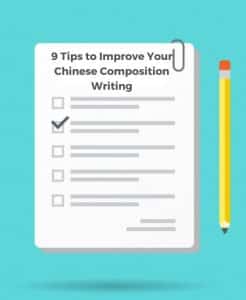
Click here to Download
Tip 1: Learn From Past Mistakes
Your past compositions are precious; don’t throw them out! Analyse your mistakes, and identify two to three areas you need to work on. If you have multiple areas to work on, prioritise the ones that will lead to the biggest gain in marks (e.g. between writing out of point and confusing homophones, fix the content issue first as that is more major).
Here are some common mistakes and recommendations on how to address them.
Tip 2: Determine the Theme of Your Composition

Be it the introduction, the body, or the conclusion, your composition should revolve around a theme. Never let your content not go out of point (离题), or your marks will suffer greatly.
Always start by analysing the picture or title to determine the theme. For example, if the title is “这件事改变了我(2023 St Nicholas’ Prelims)”,the central idea would be about an incident and how it has changed you as a person. Generally, it is easier for students to deviate from the theme for title-based compositions, especially if they do not plan their story.
That said, picture compositions can be tricky too: A few themes may be possible as it depends on how you choose to conclude the story (picture 6). For instance, in 2020’s PSLE, an old lady who was counting money at the bus stop fell down unexpectedly. Her notes were strewn all over the floor. Picture 5 shows two schoolgirls helping the old lady up while a youth was trying to pick up the lady’s belongings. Was he planning to steal the money? Or was he a kind-hearted youth trying to help pick up the notes? You need to write in a way consistent with the theme you have chosen.
Tip 3: Choose Your Question Wisely

Consider whether the picture composition (看图作文) or title-based composition (命题作文) is more manageable for you.
There are a few things to consider:
- How well do you understand the pictures? Do you have the appropriate vocabulary to describe key events and details depicted in the pictures? How complex are the pictures? E.g. does the location change multiple times?
- How well do you understand the key phrase in the title? For instance, if the title is “一件让我印象最深刻的事”, ensure you understand the meaning of 印象 and 深刻if you decide to write this particular question.
- Which question do you resonate most with? Do you have any personal experience similar to that in the pictures/what you plan to write for the title-based composition? If so, you will find it easier to complete the essay.
Remember you only have fifty minutes, so play to your strengths and make a decision within the first three minutes. Do not change your mind thereafter, or you will not have sufficient time to complete your composition!
Tip 4: Choose The Correct Point of View

For picture compositions, do not write in the first person if the character is not present in all pictures. In such instances, no matter whose perspective you adopt in your writing, there will be gaps in the story (the narrator cannot be all-knowing). Thus, you should write in the third person.
For title-based compositions, pay attention to the wording. Titles such as “这件事让我明白了耐心的重要(PSLE 2022)” and “一份我最珍惜的礼物(PSLE 2021)” must be written in the first person.
Tip 5: Plan Before You Write

“If you fail to plan, you plan to fail.” Before you start writing, craft an outline of your story. This need not be in prose form. It can be simply key words that give you clarity on your story structure. Whilst the stronger ones can wing it without a written plan (they usually have the plan in their heads), everyone else should refer to a plan while writing. The time spent making a written plan should be no more than five minutes, but it goes a long way in enhancing efficiency in your composition writing.
For picture-based compositions, your plan should at least cover the following:
- Introduction (开头)
- Conclusion (结尾)
For title-based compositions, use the guiding questions to help you plan.
For example, for 一份我最珍惜的礼物 (PSLE 2021), the outline could be:
Introduction (开头)
- Describe the present you cherish the most. What is it? Describe its appearance. How is it special?
介绍你最珍惜的礼物(这是什么礼物?外观如何?如何特殊?)
- How did you get this present? Who gave it to you?
你怎么得到这份礼物?是谁送的?
- Why did you get this present?
为什么会得到这份礼物?
- Why do you cherish it so much? What is its significance?
你为什么珍惜这份礼物?它有什么象征意义?
Conclusion (结尾)
- Restate how much you cherish this present. Sum up the main points in the body text (e.g. What does it represent? How did it help you grow/change your life?). 再次表明你有多珍惜这份礼物。总结一下以上的要点(如:它代表了什么?如何让你成长/对你的生活有什么积极影响?
Tip 6: Start With a Relevant Introduction

Do not memorise good introductions you have been given and use it word-for-word without thinking. There is no point in including the most beautifully worded description of the weather if the entire story happens indoors and the weather has no influence over the development of the story. Relevance is key.
Likewise, do not try to use a “one-size-fits-all” introduction, such as: “Ring!” The alarm went off…… If you must use a sound, make sure the sound is linked to some event at the story. Else, your introduction will either be excessively long, or appear irrelevant, or have logical gaps as you jumped from the alarm ringing right into the thick of the action.
Whether you start by directly describing the scene/activity (开门见山), by using a flashback, or any other method, what matters most is that your introduction is relevant to the theme.
For flashbacks, note that the ending will need to address the flashback, or bring the readers back to the present (前呼后应). This method will usually add to the word count, so it is not recommended for weaker students who may not have time to complete the essay or check their work.
Tip 7: Flesh Out Your Conclusion

Avoid a situation of having a magnificent start but a skinny end to the story (龙头蛇尾). Kudos to students who take time to craft a killer introduction. However, if the conclusion is weak and abrupt, your readers will end up feeling disappointed.
It is insufficient to simply state how the problem was resolved or what happened at the end. You should also highlight how the characters felt, what lessons the character(s) learnt, what plans they have for the future, and, the most important of them all, highlight the theme. A simple way to address the theme would be to use a relevant proverb, for example:
所谓“天下无难事,只怕有心人”,只要我们勇于挑战自己,世上就没有任何能难倒我们的事。
Tip 8: Revise for Paper 2 and Composition Writing Together

Don’t let your efforts to revise for Paper 2 go to waste! Make sure you master the terms in the textbooks. Make a list of those that are versatile enough to apply to most compositions. For example, transition phrases like “不知不觉 (unknowingly)” and “光阴似箭 (time flies)” can be used in almost any story to describe how time has passed unknowingly or quickly.
Besides mastering terms, make an effort to apply sentence structures and literary devices mentioned in the textbook in your writing. For instance, in Lesson 8 of the Primary 6 Chinese textbook, you can get insights on what similes are and reference the examples in the textbook (6B textbook, p. 23: 美美像一阵风一样冲过来。打针一点儿也不痛,就像蚂蚁轻轻咬了一下。) Even the conjunction questions in Paper 2 can come in handy, if you learn to vary your sentence beginnings by using different connectors.
Tip 9: Keep a Word Bank

Start building a Chinese vocabulary word bank if you do not already have one. Collate the good phrases and idioms used by others. You can start noting down good phrases from the textbook and also from the comprehension passages you have completed. Browse through your classmates’ work and other model compositions and highlight away!
Examples include (bolded):
- 我准备乘坐巴士去学校时,突然下起 倾盆大雨 。
- 老师听到我们说的话后,他 怒气冲冲 地离开了教室。
For new or unfamiliar phrases, write the entire sentence down for context. Try constructing a similar sentence on your own (get someone who is proficient in Chinese to check this if you can!). Flip through the past year questions and see if you can apply this new phrase to any of the pictures/titles!
Be disciplined and make it a point to compile the phrases regularly. As your word bank grows, you will be empowered with a list of handy phrases which you can then accurately use in your compositions.
When it comes to composition writing, it takes time, practice, and patience to improve. Apply the tips we shared above, and with tenacity and perseverance, you will see the fruits of your labour.
See more related articles and information on Writing Samurai:
- 9 Tips for PSLE Chinese Oral Exams
- 9 Exam Smart Tips for PSLE Chinese Paper 2
- Top 30 Websites and Apps for Chinese Language Learning
You might want to download a pdf copy of this article for future reference!

Follow Writing Samurai on Telegram for the latest tips and strategies for English, Chinese, and Creative Writing! Pssst... We will also share the latest compo topics during test or exam season!
Click this link to follow our channel >>> https://t.me/writingsamurai
9 Exam-Smart Tips for PSLE Chinese Paper 2
Cancel reply
Your comment ...
Leave a Reply Cancel reply
Your email address will not be published. Required fields are marked *

Writing Samurai is an online platform dedicated to nurturing children’s creative writing skills. Our courses are designed to be engaging and effective, without resorting to traditional teaching methods.
Subscribe for latest news & English tips:
Terms of Use | Privacy Policy
2024 Copyright Writing Samurai
PRIMARY ENGLISH
- Model Compositions
- Situational Writing Tips
- PSLE English Oral Exam Tips
- PSLE Chinese Oral Exam Tips
- 50 Meaningful Proverbs
- Composition Writing
- PSLE Marking Scheme

SECONDARY ENGLISH
- Past Year's O-Level Essays
- Discursive Essay Writing
- Argumentative Essay Writing
- Secondary English Writing Tips (O-Levels)
- Exam Tips for Secondary English
- 7 Exam Tips for Language Editing (O-Levels)

POPULAR TOPICS
- English Oral
- Chinese Oral
- Situational Writing
- Secondary School Writing
- Essay Writing Lower Secondary
- Synthesis & Transformation
- Calculate AL PSLE Score
TOP FREE RESOURCES
- Free English Writing Resources List
- Free Model Compositions Examples
- Video - Proverbs Composition Writing
- Video - How to Write A Powerful Introduction
- Video - How to Use Good Expressions in your Compositions
- Free Online Writing Course - Kick Start Your Writing
TOP COURSES
- Junior Writers Masterclass - P1 / P2
- Little Writers Masterclass - P3 / P4
- Creative Writing Masterclass - P5 / P6
- Chinese Composition Writing - P5 / P6
- Essay Writing Masterclass - S1 / S2
- Essay Writing - Expository & Argumentative Crash Course
- Grammar Editing Crash Course for Secondary School
- Model Composition Examples
- Free Model Compositions
- Be a Member
- English French Chinese
- General Chinese learning tips
7 Tips to Improve Your Chinese Writing Skills
Posted by Lilian Li 9289
Read the Chinese writing below and tell me how you think when you finish the reading. 大家好。我中文的名字是顾思。我二十年龄了。我工作在一所中学校,各个的目的。有时候一个替代老师, 平时当一个“学校后照顾”员。
Do you find it pleasant to read? If your answer is yes and you would also write a Chinese article like that, well, it means that your Chinese writing needs to improve! The writing above is a counter example, then how to improve your Chinese writing effectively? This article lists seven practical tips for all the Chinese learners, learn it now.
Tip 1: Expand Your Chinese Vocabulary
You can’t express yourself well if your vocabulary is limited. There is no accurate number to tell how many words the Chinese language has, and don’t ask me how many vocabularies should you learn, a good writer should expand vocabulary as much as possible. Except for vocabulary in the dictionary, you also need to learn the new buzzwords which could make your content fresh and interesting. If you have to write a large number of articles on the same topic, then increase the perfectly interchangeable words, like “美丽”, “漂亮”, “好看” are all can be used to describe the beauty .
Tip 2: Study Chinese Grammar Well
Only when you have acquired a good knowledge of Chinese grammar can you write correctly. Chinese grammar is hard and different from other languages that a lot of Chinese learners could make the mistake in the writing. Let’s get back to the sentence “我中文的名字是顾思。” in the counter example at the beginning of this article, follow Chinese grammar rules and the correct expression should be “我的中文名字是顾思”. Check out the Chinese grammar course to find out why and learn more.
Tip 3: Read Chinese Regularly
Reading is a great way to learn different styles of writing and e
xpand vocabulary. Don’t read very fast, make sure you really understand. Extract the good sentences and words during the reading are good habits.
Tip 4: Watch Movies with Chinese subtitles
Now, most Chinese movies have both Chinese subtitles and English subtitles, then watching movie become an interesting way to improve Chinese writing. In addition, a movie is a good way to get to know the life and manner of Chinese that can make your Chinese writing truthfulness.
Tip 5: Keep Writing Every day
There’s a Chinese saying 熟能生巧 means practice makes perfect. This one goes without saying, just write, write, write!
Tip 6: Check Your Chinese Writing
After finishing the writing, check one or two times by yourself to find out the easy overlook errors, then ask your teacher or Chinese friends to help if possible. Another good way to get your writing checked by others is to ask help on italki, a lot of Chinese teachers there are likely to help. It’s easy to make the same mistake, therefore, pay attention to the error and master the correct version, take notes if you’re not sure you won’t make mistakes again.
Tip 7: Try Not to Use Translator
Language Translator is a robot that it isn’t smart enough to translate the language fluently. It's okay to translate words, phrases, and common used short sentence, but for the long sentences and complex expressions, you have to write it manually to make it readable. Again, don’t rely on language translator! Here are all the keys to improving your written Chinese! If you have better ideas, welcome to share with us in the comments section!
For more Chinese learning: book a free trial class here and learn with the best Chinese teachers!
About The Author
Related articles.

Free Trial

Self-test

Concat Us

Chat online

Share Us
Want to receive regular Chinese language tips & trivia?

How to Write a Chinese Essay
by That's Mandarin | Dec 16, 2020

As a Chinese student, learning how to write an essay in this language is very important. After all, how else are you going to express yourself? Writing is one of the ways professors use to teach this language because writing helps with the retention of information.
The more essays you write, the better you get at communicating with Chinese. To write a good essay, you first have to reach a high language mastery level.
Do you admire the students who write seamless Chinese essay? If you do, then you should know that you too can achieve this level of proficiency. In the meantime, don’t be afraid to pay for your essay if you cannot write it on your own. Online academic writers are a resource each student should take advantage of.
Here are tips to help you get better at writing essays in Chinese.

Learn New Chinese Words
The key to communicating in a new language is learning as many words as you can. Take it upon yourself to learn at least one Chinese word a day. Chinese words are to essay writing what bricks are to a building. The more words you have, the better you get at constructing meaningful sentences.
Case in point, if you’re going to write a Chinese sentence that constitutes ten words, but you don’t know the right way to spell three of those words, your sentence might end up not making sense.
During your Chinese learning experience, words are your arsenal and don’t forget to master the meaning of each word you learn.
Read Chinese Literature
Reading is the most effective way of learning a new language. Remember not to read for the sake of it; find out the meaning of each new word you encounter. When you are an avid reader of Chinese literature, nothing can stop you from writing fluent Chinese.
In the beginning, it might seem like you’re not making any progress, but after a while, you will notice how drastically your writing will change. Receiving information in Chinese helps your brain get accustomed to the language’s sentence patterns, and you can translate this to your essays.
Be extensive in your reading to ensure you get as much as possible out of each article. Remember that it’s not about how fast you finish an article, but rather, how much you gain from the exercise.
Translate Articles from your Native Language to Chinese
Have you ever thought about translating your favorite read to Chinese? This exercise might be tedious, but you will learn a lot from it. The art of translation allows you to seamlessly shift from one language’s sentence pattern into the other. The more you do this, the easier it will be for your brain to convert English sentences into Chinese phrases that people can comprehend.
You can always show your Chinese professor your translations for positive criticism. The more you get corrected, the better you will get at translation. Who knows, you might actually like being a translator once you graduate.
Final Thoughts
Writing in Chinese is as foreign as writing in any other language you’re not familiar with. Despite the unfamiliarity, however, it is possible to get better at it with practice. Read as many Chinese articles as you can and make sure you learn at least one new Chinese word each day. In no time, you’ll be at pro at writing Chinese essays.

by Adrian Lomezzo
Adrian Lomezzo is a freelance writer. Firstly, he has been developing as a content manager and working with different websites, and the main goal of his was to develop the content making it in the first place. Secondly, Adrian had a big desire to help students and adults in self-development in this field and teach them to improve their skills. As a lover of traveling, he did not want to be in one place, and became a writer who could be closer to everyone, and share precious information from the corners of the world.
Submit a Comment Cancel reply
Your email address will not be published. Required fields are marked *
Submit Comment
Other posts you might like

Breaking Down Barriers: Movies and TV Shows in Chinese Language Learning
May 26, 2023

China Tourist Visa is Back! Great News for Short-Term Chinese Students
Mar 15, 2023

Traditional and Simplified Chinese Characters
Feb 20, 2023
Get 2-week FREE Chinese Classes
Original Price: ¥ 600

How to Write a Chinese Essay?

However, this is not an option.
Chinese essay writing is an important part in GCE O level Higher Chinese Language or Chinese Language exam.
Then, what are the students suppose to write in an essay? For GCE O level Chinese exam in May 2017, many parents complained about the essay questions set were too difficult ( link ). However, this is the direction we are heading in O level Chinese and the students need to level up necessarily.
Before we even talk about what to write, we must first know what will be tested.
For GCE O level Chinese exam , essay writing is in section 2 of Paper 1.
In this section, students are expected to choose to write 1 out of 3 questions, and the 3 questions will be in one of the following categories:
- 情景文 (Scenario essay writing)
- 说明文 (Expository)
- 议论文 (Argumentative)
- 材料作文 (Material essay writing)
Each category would need students to write the essay using different skill set. Students need to master the required skill set in order to write essays that meet the criteria.
For 情景文 , students need to use the skills of writing 记叙文 and characters descriptions ; for 说明文 , they need to use the skills of expository essay writing ; 议论文 needs the 3 key elements; as for 材料作文 , depending on the question, students will either need to use the skills for 记叙文 or 议论文 .
When students are clear with all these skills, they will find Chinese essay writing a lot more easier. When equipped with these necessary writing skills , they will be able to focus more on acquiring their language skills.
With our help, we are confident that our students are able to master all these essential Chinese essay writing skills.
Call 97690373 today to register for our class.
Leave a Comment Cancel Reply
Your email address will not be published. Required fields are marked *

Good composition phrases – A quick and easy guide

Using good composition phrases in your Chinese compo can definitely add that wow factor into your writing. However, what kind of words or phrases qualify as good?
In this Chinese composition writing guide, we’ll cover the following:
- What is a good Chinese compo phrase
- Examples of good words and phrases that you can use in your Chinese composition
- Common mistakes that primary school kids make with these words and phrases
- What to take note of when using these words and phrases
Let’s dive right in!
What makes a Chinese composition phrase good?
Many parents and students believe that the good phrases that primary school teachers are looking out for are Chinese idioms (成语 cheng yu), classic sayings (俗语 su yu / 谚语 yan yu) and bombastic expressions.
As an ex-MOE Chinese teacher, I can tell that this is true only to a certain extent.
Think about this. Why do we want to write these so-called good phrases in our compositions in the first place?
You just want your compositions to sound more expressive and interesting, right? But this doesn’t mean they have to be complicated.
Good Chinese compo phrases can also include:
- Descriptive words and phrases
- Transitional phrases
Since there is no standard set of good words and phrases, don’t bother memorizing those so-called “good phrases” that you find in your Chinese assessment books or guide books you see at Popular bookstore. They are good resources, but memorization is too painful.
Instead, try coming up with your own unique expressions!
Sure, this takes some imagination and training. However, if you can pull it off, your Chinese composition is going to stand out from the typical model composition writings and sound much more natural!
To help you get started, here are some examples of good phrases that you can use for writing your next Chinese composition.
Good Chinese phrases for composition writing
Here are some examples of good Chinese phrases (作文好词好句) that can describe the feelings of a character in your compo!
Chinese compo phrases for happy
Chinese compo phrases for sad.
- 眼泪像断了线的珍珠似的
Phrases to describe anger in Chinese
Which of these Chinese compo word or phrases do you like?
Why should we use good words and phrases in our Chinese compositions
Good words and phrases can be helpful if you are the kind who finds yourself using the same words or phrases over and over again when you are doing your Chinese zuo wen.
Having a variety of Chinese compo phrases in your toolbox gives you the flexibility to express yourself a little differently each time.
Common misconception about good composition phrases
1. the more good phrases you use, the more impressive your compo is.
Many primary school children often make the mistake of memorizing these words and phrases without understanding.
That’s a big no-no.
Not only is memorizing painful, it kills the interest of learning in your primary school years.
If you want to use good phrases to improve your writing, you need to understand what the words and phrases mean so that you can use them correctly. Otherwise, your composition may end up sounding weird or even nonsensical.
So make sure that you really understand what each good phrase mean so that you can choose the most appropriate one to use for your writing. Being able to match the right phrase to the right situation is key to making your Chinese composition shine.
2. The more words and phrases in my compo, the merrier
Stuffing your Chinese composition with good phrases or idioms in every sentence isn’t going to impress your teachers and make you sound smart.
Instead, too many good words and phrases can make your story sound clunky and mechanical.
So here’s a tip! When it comes using descriptive words and phrases in your composition, less is more.
For example, if the characters in the story has not much emotions, focus on narrating the story clearly and be as descriptive as you can. Using the right transitional words instead of good words and phrases would help the flow of your composition.
However, if your main character is experiencing some very strong emotions, elaborate on that by using more descriptive words. You need to choose the right thing to focus on depending on the situation.
Acing your Chinese composition with/without good phrases

Throughout my decade of experience as a teacher and PSLE composition marker, I know that a good piece of writing isn’t graded based on how many good phrases are used.
Instead, it’s based on the quality of your content and your writing fluency. Being descriptive and expressive is a bonus, but if you can bring the same points across with simple words, you can ace your composition too!
So do be natural when writing, never use good phrases for the sake of using them because you have spent a lot of time learning. As long as your composition is a written in a clear and expressive manner, it’s possible to ace it!
Follow my blog for updates
- Composition Tips
- Comprehension Tips
- Useful Phrases
Get your free Chinese compo cheatsheet!
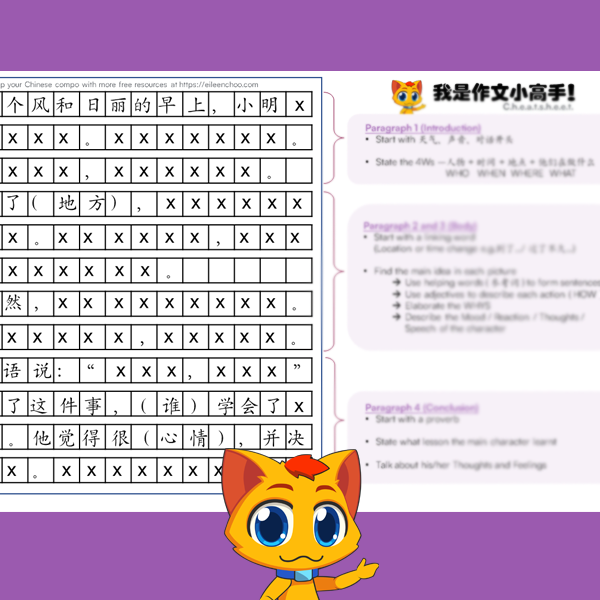
Recommended For You

- Skip to primary navigation
- Skip to main content
- Skip to primary sidebar
- Skip to footer
StoryLearning
Learn A Language Through Stories
How to Write in Chinese – A Beginner’s Guide
You probably think learning how to write in Chinese is impossible.
And I get it.
I’m a native English speaker, and I know how complex Chinese characters seem.
But you’re about to learn that it's not impossible .
I’ve teamed up with Kyle Balmer from Sensible Chinese to show you how you can learn the basic building blocks of the Chinese written language, and build your Chinese vocabulary quickly.
First, you’ll learn the basics of how the Chinese written language is constructed. Then, you’ll get a step-by-step guide for how to write Chinese characters sensibly and systematically .
Wondering how it can be so easy?
Then let’s get into it.
Don't have time to read this now? Click here to download a free PDF of the article
By the way, if you want to learn Chinese fast and have fun, my top recommendation is Chinese Uncovered which teaches you through StoryLearning®.
With Chinese Uncovered you’ll use my unique StoryLearning® method to learn Chinese through story… not rules.
It’s as fun as it is effective.
If you’re ready to get started, click here for a 7-day FREE trial.
How To Write In Chinese
Chinese is a complex language with many dialects and varieties.
Before we dive into learning to write Chinese characters, let’s just take a second to be clear exactly what we’ll be talking about.
First, you’ll be learning about Mandarin Chinese , the “standard” dialect. There are 5 main groups of dialects and perhaps 200 individual dialects in China & Taiwan. Mandarin Chinese is the “standard” used in Beijing and spoken or understood, by 2/3 of the population.
Second, there are two types of Chinese characters: Traditional and Simplified . In this article, we’ll be talking about Simplified Chinese characters, which are used in the majority of Mainland China.
There is an ongoing politicised debate about the two kinds of characters, and those asking themselves: “Should I learn traditional or simplified Chinese characters?” can face a difficult choice.
- For more on difference between Simplified and Traditional characters read this article
- To learn more about “the debate” read this excellent Wikipedia article
- If you want to switch Simplified characters into Traditional, you might like the fantastic New Tong Wen Tang browser plugin
First Steps in Learning Chinese Characters
When learning a European language, you have certain reference points that give you a head start.
If you're learning French and see the word l'hotel , for example, you can take a pretty good guess what it means! You have a shared alphabet and shared word roots to fall back on.
In Chinese this is not the case.
When you're just starting out, every sound, character, and word seems new and unique. Learning to read Chinese characters can feel like learning a whole set of completely illogical, unconnected “squiggles”!
The most commonly-taught method for learning to read and write these “squiggles” is rote learning .
Just write them again and again and practise until they stick in your brain and your hand remembers how to write them! This is an outdated approach, much like reciting multiplication tables until they “stick”.
I learnt this way.
Most Chinese learners learnt this way.
It's painful…and sadly discourages a lot of learners.
However, there is a better way.
Even without any common reference points between Chinese and English, the secret is to use the basic building blocks of Chinese, and use those building blocks as reference points from which to grow your knowledge of written Chinese.
This article will:
- Outline the different levels of structure inherent in Chinese characters
- Show you how to build your own reference points from scratch
- Demonstrate how to build up gradually without feeling overwhelmed
The Structure Of Written Chinese
The basic structure of written Chinese is as follows:
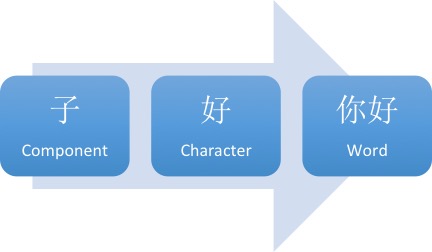
I like to think of Chinese like Lego . .. it's very “square”!
The individual bricks are the components (a.k.a radicals ).
We start to snap these components together to get something larger – the characters.
We can then snap characters together in order to make Chinese words.
Here's the really cool part about Chinese: Each of these pieces, at every level, has meaning.
The component, the character, the word… they all have meaning.
This is different to a European language, where the “pieces” used to make up words are letters.
Letters by themselves don't normally have meaning and when we start to clip letters together we are shaping a sound rather than connecting little pieces of meaning. This is a powerful difference that comes into play later when we are learning vocabulary.
Let's look at the diagram again.
Here we start with the component 子. This has the meaning of “child/infant”.
The character 好 (“good”) is the next level. Look on the right of the character and you'll see 子. We would say that 子 is a component of 好.
Now look at the full word 你好 (“Hello”). Notice that the 子 is still there.
- The character 好 is built of the components 女 and 子.
- The character 你 is built from 人 + 尔.
- The word 你好 in turn is constructed out of 你 + 好.
Here's the complete breakdown of that word in an easy-to-read diagram:
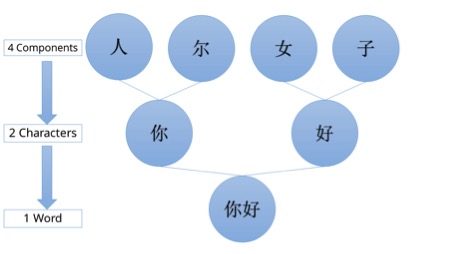
Now look at this photo of this in real life !
Don't worry if you can't understand it. Just look for some shapes that you have seen before.

The font is a little funky, so here are the typed characters: 好孩子
What components have you seen before?
Did you spot them?

This is a big deal.
Here's why…
Why Character Components Are So Important
One of the big “scare stories” around Chinese is that there are 50,000 characters to learn.
Now, this is true. But learning them isn't half as bad as you think.
Firstly, only a few thousand characters are in general everyday use so that number is a lot more manageable.
Second, and more importantly, those 50,000 characters are all made up of the same 214 components .
And you already know one of them: 子 (it's one of those 214 components).
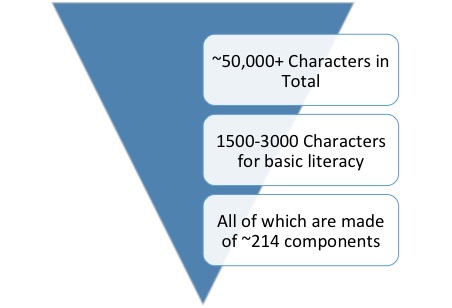
The fact that you can now recognise the 子 in the image above is a huge step forward.
You can already recognise one of the 214 pieces all characters are made up of.
Even better is the fact that of these 214 components it's only the 50-100 most common you'll be running into again and again.
This makes Chinese characters a lot less scary.
Once you get a handle on these basic components, you'll quickly recognise all the smaller pieces and your eyes will stop glazing over!
This doesn't mean you'll necessarily know the meaning or how to pronounce the words yet (we'll get onto this shortly) but suddenly Chinese doesn't seem quite so alien any more.
Memorising The Components Of Chinese Characters
Memorising the pieces is not as important as simply realising that ALL of Chinese is constructed from these 214 pieces.
When I realised this, Chinese became a lot more manageable and I hope I've saved you some heartache by revealing this early in your learning process!
Here are some useful online resources for learning the components of Chinese characters:
- An extensive article about the 214 components of Chinese characters with a free printable PDF poster.
- Downloadable posters of all the components, characters and words.
- If you like flashcards, there's a great Anki deck here and a Memrise course here .
- Wikipedia also has a sweet sortable list here .
TAKEAWAY : Every single Chinese character is composed of just 214 “pieces”. Only 50-100 of these are commonly used. Learn these pieces first to learn how to write in Chinese quickly.
Moving From Components To Chinese Characters
Once you've got a grasp of the basic building blocks of Chinese it's time to start building some characters!
We used the character 好 (“good”) in the above example. 好 is a character composed of the components 女 (“woman”) and 子 (“child”).
Unlike the letters of the alphabet in English, these components have meaning .
(They also have pronunciation, but for the sake of simplicity we'll leave that aside for now!)
- 女 means “woman” and 子 means “child”.
- When they are put together, 女 and 子 become 好 …and the meaning is “good”.
- Therefore “woman” + “child” = “good” in Chinese 🙂
When learning how to write in Chinese characters you can take advantage of the fact that components have their own meanings.
In this case, it is relatively easy to make a mnemonic (memory aid) that links the idea of a woman with her baby as “good”.
Because Chinese is so structured, these kind of mnemonics are an incredibly powerful tool for memorisation.
Some characters, including 好, can also be easily represented graphically. ShaoLan's book Chineasy does a fantastic job of this.
Here's the image of 好 for instance – you can see the mother and child.

Visual graphics like these can really help in learning Chinese characters.
Unfortunately, only around 5% of the characters in Chinese are directly “visual” in this way. These characters tend to get the most attention because they look great when illustrated.
However, as you move beyond the concrete in the more abstract it becomes harder and harder to visually represent ideas.
Thankfully, the ancient Chinese had an ingenious solution, a solution that actually makes the language a lot more logical and simple than merely adding endless visual pictures.
Watch Me Write Chinese Characters
In the video below, which is part of a series on learning to write in Chinese , I talk about the process of actually writing out the characters. Not thousands of times like Chinese schoolchildren. But just as a way to reinforce my learning and attack learning Chinese characters from different angles.
My Chinese handwriting leaves a lot to be desired. But it's more about a process of reinforcing my language learning via muscle memory than perfecting my handwriting.
You'll also hear me discuss some related issues such as stroke order and typing in Chinese.
The Pronunciation Of Chinese Characters
The solution was the incredibly unsexy sounding… (wait for it…) “phono-semantic compound character”.
It's an awful name, so I'm going to call them “sound-meaning characters” for now!
This concept is the key to unlocking 95% of the Chinese characters.
A sound-meaning character has a component that tells us two things:
- the meaning
- a clue to how the character is pronounced
So, in simple terms:
95% of Chinese characters have a clue to the meaning of the character AND its pronunciation.
到 means “to arrive”.
This character is made of two components. On the left is 至 and on the right is 刀.
These are two of the 214 components that make up all characters. 至 means “to arrive” and 刀 means “knife”.
Any idea which one gives us the meaning? Yup – it's 至, “to arrive”! (That was an easy one 🙂 )
But how about the 刀? This is where it gets interesting.
到 is pronounced dào.
刀, “knife” is pronounced dāo.
The reason the 刀 is placed next to 至 in the character 到 is just to tell us how to pronounce the character! How cool is that?
Now, did you notice the little lines above the words: dào and dāo?
Those are the tone markers, and in this case they are both slightly different. These two characters have different tones so they are not exactly the same pronunciation.
However, the sound-meaning compound has got us 90% of the way to being able to pronounce the character, all because some awesome ancient Chinese scribe thought there should be a shortcut to help us remember the pronunciation!
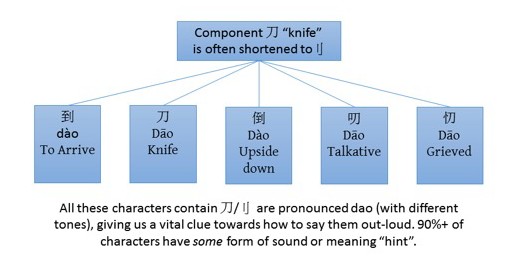
Let's look at a few more examples of how 刀 is used in different words to give you an idea of the pronunciation.
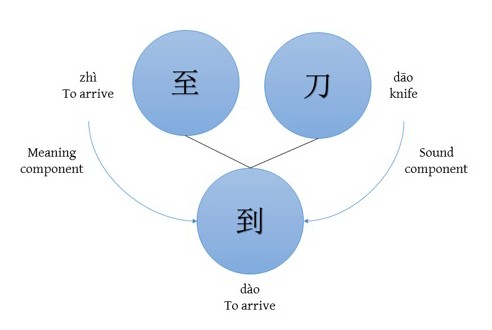
Even if sometimes:
- the sound-meaning character gives us the exact sound and meaning
- or it gets us in the ballpark
- or worse it is way off because the character has changed over the last 5,000 years!
Nevertheless, there's a clue about the pronunciation in 95% of all Chinese characters, which is a huge help for learning how to speak Chinese.
TAKEAWAY : Look at the component parts as a way to unlock the meaning and pronunciations of 95% of Chinese characters. In terms of “hacking” the language, this is the key to learning how to write in Chinese quickly.
From Chinese Characters To Chinese Words
First we went from components to characters.
Next, we are going from characters to words.
Although there are a lot of one-character words in Chinese, they tend to either be classically-rooted words like “king” and “horse” or grammatical particles and pronouns.
The vast majority of Chinese words contain two characters.
The step from characters to words is where, dare I say it, Chinese script gets easy!
Come on, you didn't think it would always be hard did you? 🙂
Unlike European languages Chinese's difficulty is very front-loaded.
When you first learn to write Chinese, you'll discover a foreign pronunciation system, a foreign tonal system and a very foreign writing system.
As an English speaker, you can normally have a good shot at pronouncing and reading words in other European languages, thanks to the shared alphabet.
Chinese, on the other hand, sucker-punches you on day one… but gets a little more gentle as you go along.
One you've realised these things:
- there aren't that many components to deal with
- all characters are made up of these basic components
- words are actually characters bolted together
…then it's a matter of just memorising a whole bunch of stuff!
That's not to say there isn't a lot of work involved, only to say that it's not particularly difficult. Time-consuming, yes. Difficult, no.
This is quite different from European languages, which start off easy, but quickly escalate in difficulty as you encounter complicated grammar, tenses, case endings, technical vocabulary and so on.
Making words from Chinese characters you already know is easy and really fun . This is where you get to start snapping the lego blocks together and build that Pirate Island!
The Logic Of Chinese Writing
Here are some wonderful examples of the simplicity and logic of Chinese using the character 车 which roughly translates as “vehicle”.
- Water + Vehicle = Waterwheel = 水 +车
- Wind + Vehicle = Windmill = 风+车
- Electric + Vehicle = Tram/Trolley = 电+车
- Fire + Vehicle = Train = 火+车
- Gas + Vehicle = Car = 汽+车
- Horse + Vehicle = Horse and cart/Trap and Pony = 马+车
- Up + Vehicle = Get into/onto a vehicle =上+车
- Down + Vehicle = Get out/off a vehicle =下+车
- Vehicle + Warehouse = Garage = 车+库
- To Stop + Vehicle = to park = 停+车
Chinese is extremely logical and consistent.
This is a set of building blocks that has evolved over 5,000 years in a relatively linear progression. And you can't exactly say the same about the English language!
Just think of the English words for the Chinese equivalences above:
Train, windmill, millwheel/waterwheel, tram/trolley, car/automobile, horse and cart/trap and pony.
Unlike Chinese where these concepts are all linked by 车 there's very little consistency in our vehicle/wheel related vocabulary, and no way to link these sets of related concepts via the word itself.
English is a diverse and rich language, but that comes with its drawbacks – a case-by-case spelling system that drives learners mad.
Chinese, on the other hand, is precise and logical, once you get over the initial “alienness”.

Making The Complex Simple
This logical way of constructing vocabulary is not limited to everyday words like “car” and “train”. It extends throughout the language.
To take an extreme example let's look at Jurassic Park .
The other day I watched Jurassic Park with my Chinese girlfriend. (OK, re -watched. It's a classic!)
Part of the fun for me (annoyance for her) was asking her the Chinese for various dinosaur species.
Take a second to look through these examples. You'll love the simplicity!
- T Rex 暴龙 = tyrant + dragon
- Tricerotops 三角恐龙 three + horn + dinosaur
- Diplodocus 梁龙 roof-beam + dragon
- Velociraptor 伶盗龙 clever + thief + dragon (or swift stealer dragon)
- Stegosaurus 剑龙 (double-edged) sword + dragon
- Dilophosaurus 双脊龙 double+spined+dragon
Don't try to memorise these characters, just appreciate the underlying logic of how the complex concepts are constructed .
(Unless, of course, you are a palaeontologist…or as the Chinese would say a Ancient + Life + Animal + Scientist!).
I couldn't spell half of these dinosaur names in English for this article. But once I knew how the construction of the Chinese word, typing in the right characters was simple.
Once you know a handful of characters, you can start to put together complete words, and knowing how to write in Chinese suddenly becomes a lot easier.
In a lot of cases you can take educated guesses at concepts and get them right by combining known characters into unknown words.
For more on this, check my series of Chinese character images that I publish on this page . They focus on Chinese words constructed from common characters, and help you understand more of the “building block” logic of Chinese.
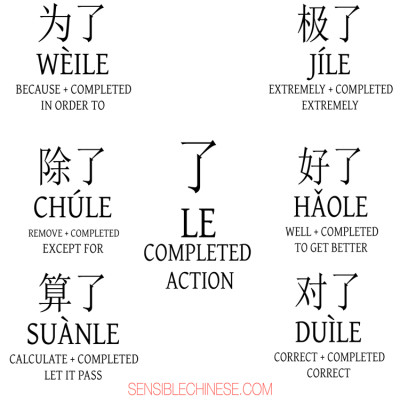
TAKEAWAY : Chinese words are constructed extremely logically from the underlying characters. This means that once you've learned a handful of characters vocabulary acquisition speeds up exponentially.
How To Learn Written Chinese Fast
Before diving into learning characters, make sure you have a decent grounding in Chinese pronunciation via the pinyin system.
The reason for this is that taking on pronunciation, tones and characters from day one is really tough.
Don't get me wrong, you can do it. Especially if you're highly motivated. But for most people there's a better way.
Learn a bit of spoken Chinese first.
With some spoken language under your belt, and an understanding of pronunciation and tones, starting to learn how to write in Chinese will seem a whole lot easier.
When you're ready, here's how to use all the information from this article and deal with written Chinese in a sensible way.
I've got a systematic approach to written Chinese which you can find in detail on Sensible Chinese .
Right now, I'm going to get you started with the basics.
The Sensible Character System
The four stages for learning Chinese characters are:
Sounds technical huh? Don't worry, it's not really.
This part of the process is about choosing what you put into your character learning system.
If you're working on the wrong material then you're wasting your efforts. Instead choose to learn Chinese characters that you are like to want to use in the future.
My list in order of priority contains:
- daily life: characters/words I've encountered through daily life
- textbooks: characters/words I've learnt from textbooks
- frequency lists: characters/words I've found in frequency lists of the most common characters and words
2. Processing
This is the “learning” part of the system.
You take a new word or character and break it down into its component parts. You can then use these components to create memory aids.
Hanzicraft.com or Pleco's built-in character decomposition tool are fantastic for breaking down new characters. These will be helpful until you learn to recognise the character components by sight. These tools will also show you if there are sound-meaning component clues in the character.
Use the individual components of a character to build a “story” around the character. Personal, sexy and violent stories tend to stick in the mind best! 🙂 I also like to add colours into my stories to represent the tones (1st tone Green, 2nd tone Blue etc.)
After the “input” and the “process”… it's time to review it all!
The simplest review system is paper flashcards which you periodically use to refresh your memory.
A more efficient method can be found in software or apps that use a Spaced Repetition System, like Anki or Pleco .
An important point: Review is not learning .
It's tempting to rely on software like Anki to drill in the vocabulary through brute-force repetition. But don't skip the first two parts – processing the character and creating a mnemonic are key parts of the process.
It isn't enough to just learn and review your words… you also need to put them into use !
Thankfully, technology has made this easier than ever. Finding a language exchange partner or a lesson with a cost-effective teacher is super simple nowadays, so there's no excuse for not putting your new vocabulary into action!
The resources I personally use are:
- Spoken – iTalki
- Written – Lang-8
- Short form written – WeChat / HelloTalk
Importantly, whilst you are using your current vocabulary in these forms of communication, you'll be picking up new content all the time, which you can add back into your system.
The four steps above are a cycle that you will continue to rotate through – all the corrections and new words you receive during usage should become material to add to the system.
To recap, the four steps of systematically learning Chinese characters are:
By building these steps into your regular study schedule you can steadily work through the thousands of Chinese characters and words you'll need to achieve literacy.
This is a long-haul process! So having a basic system in place is very important for consistency.
You can find out a lot more about The Sensible Chinese Character Learning System and how to write in Chinese here .
Top Chinese Learning Links And Resources
- Chinese Language Learning Resource List – a curated list of tools and content available online and in print to help your Chinese learning, all categorised by usage type.
- Sensible Character Learning System – the full system outlined in a series of blog articles for those who want more detail and tips on how to refine their character learning.
- 111 Mandarin Chinese resources you wish you knew – Olly’s huge list of the best resources on the web for learning Chinese
I hope you enjoyed this epic guide to learning how to write in Chinese!
Please share this post with any friends who are learning Chinese, then leave us a comment below!
Language Courses
- Language Blog
- Testimonials
- Meet Our Team
- Media & Press
Download this article as a FREE PDF ?
What is your current level in Swedish?
Perfect! You’ve now got access to my most effective [level] Swedish tips…
Where shall I send the tips and your PDF?
We will protect your data in accordance with our data policy.
What is your current level in Danish?
Perfect! You’ve now got access to my most effective [level] Danish tips…
NOT INTERESTED?
What can we do better? If I could make something to help you right now, w hat would it be?
Which language are you learning?
What is your current level in [language] ?
Perfect! You’ve now got access to my most effective [level] [language] tips, PLUS your free StoryLearning Kit…
Where shall I send them?
Download this article as a FREE PDF?
Great! Where shall I send my best online teaching tips and your PDF?
Download this article as a FREE PDF ?
What is your current level in Arabic?
Perfect! You’ve now got access to my most effective [level] Arabic tips…
FREE StoryLearning Kit!
Join my email newsletter and get FREE access to your StoryLearning Kit — discover how to learn languages through the power of story!
Download a FREE Story in Japanese!
Enter your email address below to get a FREE short story in Japanese and start learning Japanese quickly and naturally with my StoryLearning® method!
What is your current level in Japanese?
Perfect! You’ve now got access to the Japanese StoryLearning® Pack …
Where shall I send your download link?
Download Your FREE Natural Japanese Grammar Pack
Enter your email address below to get free access to my Natural Japanese Grammar Pack and learn to internalise Japanese grammar quickly and naturally through stories.
Perfect! You’ve now got access to the Natural Japanese Grammar Pack …
What is your current level in Portuguese?
Perfect! You’ve now got access to the Natural Portuguese Grammar Pack …
What is your current level in German?
Perfect! You’ve now got access to the Natural German Grammar Pack …
Train as an Online Language Teacher and Earn from Home
The next cohort of my Certificate of Online Language Teaching will open soon. Join the waiting list, and we’ll notify you as soon as enrolment is open!
Perfect! You’ve now got access to my most effective [level] Portuguese tips…
What is your current level in Turkish?
Perfect! You’ve now got access to my most effective [level] Turkish tips…
What is your current level in French?
Perfect! You’ve now got access to the French Vocab Power Pack …
What is your current level in Italian?
Perfect! You’ve now got access to the Italian Vocab Power Pack …
Perfect! You’ve now got access to the German Vocab Power Pack …
Perfect! You’ve now got access to the Japanese Vocab Power Pack …
Download Your FREE Japanese Vocab Power Pack
Enter your email address below to get free access to my Japanese Vocab Power Pack and learn essential Japanese words and phrases quickly and naturally. (ALL levels!)
Download Your FREE German Vocab Power Pack

Enter your email address below to get free access to my German Vocab Power Pack and learn essential German words and phrases quickly and naturally. (ALL levels!)
Download Your FREE Italian Vocab Power Pack
Enter your email address below to get free access to my Italian Vocab Power Pack and learn essential Italian words and phrases quickly and naturally. (ALL levels!)
Download Your FREE French Vocab Power Pack
Enter your email address below to get free access to my French Vocab Power Pack and learn essential French words and phrases quickly and naturally. (ALL levels!)
Perfect! You’ve now got access to the Portuguese StoryLearning® Pack …
What is your current level in Russian?
Perfect! You’ve now got access to the Natural Russian Grammar Pack …
Perfect! You’ve now got access to the Russian StoryLearning® Pack …
Perfect! You’ve now got access to the Italian StoryLearning® Pack …
Perfect! You’ve now got access to the Natural Italian Grammar Pack …
Perfect! You’ve now got access to the French StoryLearning® Pack …
Perfect! You’ve now got access to the Natural French Grammar Pack …
What is your current level in Spanish?
Perfect! You’ve now got access to the Spanish Vocab Power Pack …
Perfect! You’ve now got access to the Natural Spanish Grammar Pack …
Perfect! You’ve now got access to the Spanish StoryLearning® Pack …
Where shall I send them?
What is your current level in Korean?
Perfect! You’ve now got access to my most effective [level] Korean tips…
Perfect! You’ve now got access to my most effective [level] Russian tips…
Perfect! You’ve now got access to my most effective [level] Japanese tips…
What is your current level in Chinese?
Perfect! You’ve now got access to my most effective [level] Chinese tips…
Perfect! You’ve now got access to my most effective [level] Spanish tips…
Perfect! You’ve now got access to my most effective [level] Italian tips…
Perfect! You’ve now got access to my most effective [level] French tips…
Perfect! You’ve now got access to my most effective [level] German tips…
Download Your FREE Natural Portuguese Grammar Pack
Enter your email address below to get free access to my Natural Portuguese Grammar Pack and learn to internalise Portuguese grammar quickly and naturally through stories.
Download Your FREE Natural Russian Grammar Pack
Enter your email address below to get free access to my Natural Russian Grammar Pack and learn to internalise Russian grammar quickly and naturally through stories.
Download Your FREE Natural German Grammar Pack
Enter your email address below to get free access to my Natural German Grammar Pack and learn to internalise German grammar quickly and naturally through stories.
Download Your FREE Natural French Grammar Pack
Enter your email address below to get free access to my Natural French Grammar Pack and learn to internalise French grammar quickly and naturally through stories.
Download Your FREE Natural Italian Grammar Pack
Enter your email address below to get free access to my Natural Italian Grammar Pack and learn to internalise Italian grammar quickly and naturally through stories.
Download a FREE Story in Portuguese!

Enter your email address below to get a FREE short story in Brazilian Portuguese and start learning Portuguese quickly and naturally with my StoryLearning® method!
Download a FREE Story in Russian!
Enter your email address below to get a FREE short story in Russian and start learning Russian quickly and naturally with my StoryLearning® method!
Download a FREE Story in German!
Enter your email address below to get a FREE short story in German and start learning German quickly and naturally with my StoryLearning® method!
Perfect! You’ve now got access to the German StoryLearning® Pack …
Download a FREE Story in Italian!
Enter your email address below to get a FREE short story in Italian and start learning Italian quickly and naturally with my StoryLearning® method!
Download a FREE Story in French!

Enter your email address below to get a FREE short story in French and start learning French quickly and naturally with my StoryLearning® method!
Download a FREE Story in Spanish!
Enter your email address below to get a FREE short story in Spanish and start learning Spanish quickly and naturally with my StoryLearning® method!
FREE Download:
The rules of language learning.

Enter your email address below to get free access to my Rules of Language Learning and discover 25 “rules” to learn a new language quickly and naturally through stories.
What can we do better ? If I could make something to help you right now, w hat would it be?
What is your current level in [language]?
Perfect! You’ve now got access to my most effective [level] [language] tips…
Download Your FREE Spanish Vocab Power Pack

Enter your email address below to get free access to my Spanish Vocab Power Pack and learn essential Spanish words and phrases quickly and naturally. (ALL levels!)
Download Your FREE Natural Spanish Grammar Pack
Enter your email address below to get free access to my Natural Spanish Grammar Pack and learn to internalise Spanish grammar quickly and naturally through stories.
Free Step-By-Step Guide:
How to generate a full-time income from home with your English… even with ZERO previous teaching experience.
What is your current level in Thai?
Perfect! You’ve now got access to my most effective [level] Thai tips…
What is your current level in Cantonese?
Perfect! You’ve now got access to my most effective [level] Cantonese tips…
Steal My Method?
I’ve written some simple emails explaining the techniques I’ve used to learn 8 languages…
I want to be skipped!
I’m the lead capture, man!
Join 84,574 other language learners getting StoryLearning tips by email…
“After I started to use your ideas, I learn better, for longer, with more passion. Thanks for the life-change!” – Dallas Nesbit
Perfect! You’ve now got access to my most effective [level] [language] tips…
Perfect! You’ve now got access to my most effective [level] [language] tips…
Join 122,238 other language learners getting StoryLearning tips by email…
Find the perfect language course for you.
Looking for world-class training material to help you make a breakthrough in your language learning?
Click ‘start now’ and complete this short survey to find the perfect course for you!
Do you like the idea of learning through story?
Do you want…?

The Step-By-Step Guide To Write A Good Chinese Composition: Picture Composition For Higher Primary

Before getting down to a Chinese composition, the student needs to learn what makes it excellent—knowing how the questions work lets you cope with them efficiently.
Before we get into the step-by-step process of writing a tip-top Chinese Picture Composition, here’s a brief of you should know.
For a Picture Composition, there will be six pictures provided in the question. The first five depicts the beginning and climax of an incident, while the last image shows a question mark which requires students to plan and write a logical conclusion to the story.
Related: 8 Tips To Improve Chinese Composition In Primary School
The writing process
Try the following four-step process to write a piece of Chinese composition that’s up to the mark (and feel free to apply it to subsequent ones).
Step #1 Read the instructions carefully
Ah, the sweet, age-old advice. It’s a rule that seems so simple, but yet so hard to fulfil. Students often rush in exams when they get nervous. Teach your kid not to rush when they’re reading the instructions such as the minimum number of characters required. Also, the reference terms and phrases are great for setting the direction of the story context if students are at a loss.

Step #2 Observe the details of the pictures
While reading, it’s unimaginable how one can miss out on specific facts and details. Highlight keywords and/or phrases—anything that comes off as brow-raising or notable, or questionable—as well as making mental notes. Digression from the topic can cost huge marks, and this first step will ensure that pupils don’t get sidetracked. But, it’s wise not to spend too much time on this step as incompletion of work costs marks too! Also, the observation doesn’t end here. Train your child to interpret their observations. Carefully think about what these observations add up to—this will make step #4 easier.
Step #3 Think and decide on the prologue
Simply put, the prologue is the image before the first image. A preface is like a starter. It opens up the patron’s, in this case, the reader’s, appetite and provides a hint of what’s to come. Exceptionally accurate for picture composition, it’s implausible to create a story with rationale and reasoning by simply narrating what’s shown. A well-thought-out prologue gives necessary information on why the scenario in the pictures or the passage happened , helping readers understand the story better.
Related: 7 Expert-Approved Primary School Chinese Composition Writing Examples
Step #4 Think about the 5ws and 1h (or list them if there’s time)
There’s nothing worse than being caught in a jumble of messed-up thoughts. The 5ws and 1h—the final step in getting the skeleton of the composition secured—gives your little one a clear guideline of how the story should unfold, from the introduction to the passage, climax and the conclusion.

A simple guide to improving primary school composition
Students from primary three onwards will start to write compositions. The initial stages could be confusing, strange and discouraging. For parents to guide students through the writing process, take note of the following:
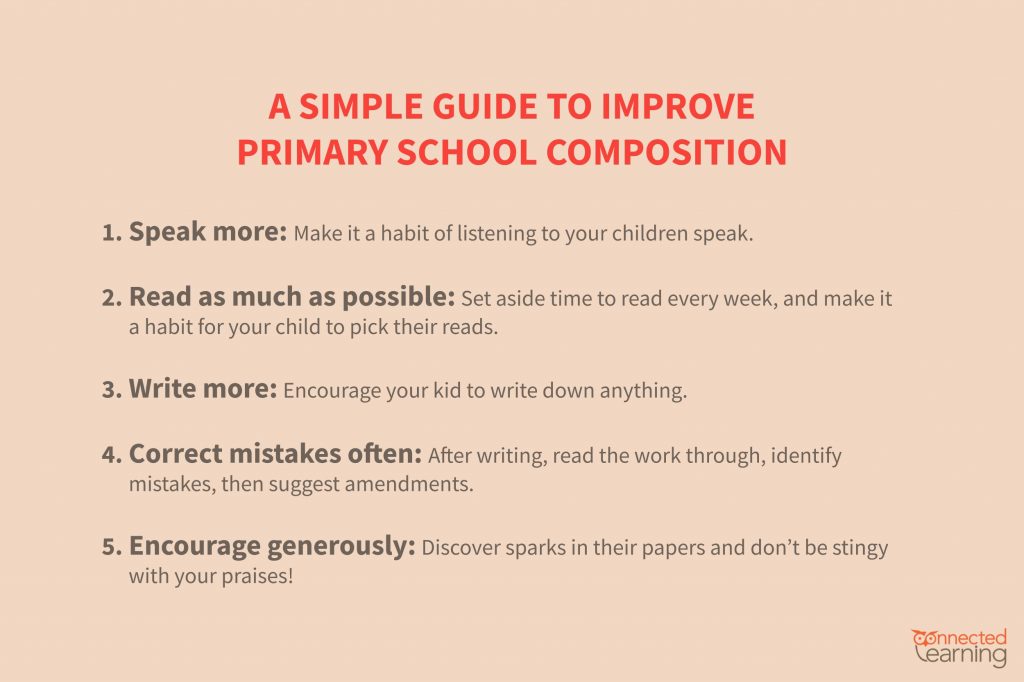
1. Speak more
“Speaking” means expressing what you see, hear, and think in words. Make it a habit of listening to your children speak. They can introduce people, things, natural scenery or hobbies, etc. Here’s a good activity: Hear them out for roughly 3 minutes and rearrange thoughts at certain parts where they seemed confused.
2. Read as much as possible
There’s a reason why reading has such a huge buzz. The novelist Stephen King once said, ‘If you don’t have the time to read, you don’t have the tools to write’. Set aside time to read every week, and make it a habit for your child to pick their reads.
3. Write more
Writing materials come from daily lives; things that you can see and hear. Encourage your kid to write down anything , be it a scene from a movie, or a piece of exciting news.
4. Correct mistakes often
The greatest teacher your kid will ever have is ‘mistakes ’. After writing, read the work through, identify mistakes, then suggest amendments. Refrain from reprimanding mistakes. Instead, have genuine discussions or conversations with your child about these blunders. This little move can strengthen their comfort level at making mistakes and encourage them to face errors at ease in future.
5. Encourage generously
Not every piece of your child’s work will be spectacular. But there’s always something interesting in their writings. Anything counts; it could be great sentences, the emotions portrayed, concise train of thought, etc. Discover sparks in their papers and don’t be stingy with your praises!
Related: 8 Tips To Improve Chinese Composition In Primary School
As we mentioned, reading holds an unquestionably crucial part to improve writing, and it’s sensible to read religiously. Take 15 minutes each day to read extracurricular books. To make the most out of these minutes, jot down uncommon words, sentences, and your comments.
Kids having trouble learning, remembering and using new Chinese idioms, terms and phrases? Our tutors are trained to engage students in the lessons where they’ll be able to pick up new knowledge, and eventually produce promising and sophisticated pieces of writing in time to come. Hurry and sign up for a free trial lesson now!

Liked this? Share it now!
Related posts.

How to Strengthen Chinese for K2 Children

Primary School Chinese Writing: Narrative Composition

Excelling in Chinese Oral PSLE: Expectations vs Reality

Chinese Words and Idioms (词语与成语) Part 4: 5 Important Tips To Learn Them

Learn Chinese Effortlessly: Extensive List of Chinese Idioms (词语与成语) Part 2

Essay on China
Students are often asked to write an essay on China in their schools and colleges. And if you’re also looking for the same, we have created 100-word, 250-word, and 500-word essays on the topic.
Let’s take a look…
100 Words Essay on China
Geography of china.
China, located in East Asia, is the world’s third-largest country. It has diverse landscapes, including mountains, deserts, and rivers. The highest point is Mount Everest.
Population and Culture
China has the largest population globally. Its culture is rich and diverse, with a long history that includes inventions like paper and compass.
Chinese Economy
China is a global economic powerhouse, known for manufacturing and exporting goods. It also has a growing technology industry.
Chinese Cuisine
Chinese food is popular worldwide. It varies by region, with famous dishes like Peking Duck and Dim Sum.
Chinese Festivals
China is known for its colorful festivals, such as Chinese New Year and the Mid-Autumn Festival, both filled with traditional customs and celebrations.
Also check:
- 10 Lines on China
- Paragraph on China
250 Words Essay on China
Introduction.
China, officially known as the People’s Republic of China, is the world’s most populous country, with a rich history that stretches back thousands of years. It has a unique blend of ancient traditions and modern innovation, shaping its global influence.
Historical Significance
China’s history is marked by dynastic rule, beginning with the semi-mythical Xia around 2100 BCE. The Great Wall, Terracotta Army, and the Forbidden City testify to the grandeur of these eras. The last dynasty, the Qing, gave way to a republic in 1912, marking a significant shift in China’s political landscape.
Modern China
Modern China is characterized by its rapid economic growth since the late 20th century. China’s economic reforms have transformed it into the world’s second-largest economy. This economic boom has brought significant changes in its socio-economic structure and global standing.
Global Influence
China’s global influence is undeniable. It’s a permanent member of the UN Security Council and a significant player in global trade. However, its rise has also sparked debates on issues such as human rights, territorial claims, and trade practices.
China’s journey from an ancient civilization to a modern powerhouse is a testament to its resilience and adaptability. Despite challenges, it continues to shape the world stage, making it a fascinating subject of study. Understanding China’s past and present is crucial for deciphering its future trajectory.
500 Words Essay on China
China, officially known as the People’s Republic of China, is a country located in East Asia. It is the world’s most populous country, boasting a population of over 1.4 billion. China’s rich history, diverse culture, and rapid economic growth have made it a global powerhouse.
Historical Overview
China’s history spans over five millennia, making it one of the world’s oldest civilizations. The country has seen the rise and fall of powerful dynasties, each leaving an indelible mark on its culture and society. China’s last imperial dynasty, the Qing, ended in 1911, paving the way for the Republic of China. However, civil unrest and power struggles culminated in the Chinese Communist Party’s victory in 1949, establishing the People’s Republic of China.
Economic Growth
China’s economic transformation in recent decades is nothing short of remarkable. The country has transitioned from a centrally planned economy to a more market-oriented one. China’s Gross Domestic Product (GDP) has grown at an unprecedented rate, lifting millions out of poverty and turning China into the world’s second-largest economy. This economic boom is largely attributed to the “Reform and Opening-up” policy initiated by Deng Xiaoping in the late 1970s.
Culture and Society
Chinese culture is a fusion of numerous ethnic traditions, deeply influenced by Confucianism, Buddhism, and Taoism. The Chinese language, cuisine, martial arts, and traditional Chinese medicine are significant cultural exports. China’s societal structure has evolved over time, with the traditional emphasis on collectivism giving way to an increasing individualism, particularly among the younger generation.
Political System
China is a socialist state under the people’s democratic dictatorship led by the working class and based on the alliance of workers and peasants. The Chinese Communist Party holds the ultimate authority, with the President serving as the state head. The political structure has been criticized for its lack of transparency and suppression of dissent, posing challenges for human rights.
China’s Global Influence
China’s rapid growth has significantly increased its global influence, both economically and politically. It is a major player in international trade, technology, and infrastructure development. However, its assertive foreign policy, territorial disputes, and alleged human rights abuses have generated controversy and tension with other nations.
China’s journey from an ancient civilization to a modern global superpower is truly fascinating. Its complex history, dynamic economy, rich culture, and evolving political landscape make it a critical player in shaping the 21st century. As China continues to evolve, it will undoubtedly remain a significant entity on the global stage, presenting both opportunities and challenges for the international community.
That’s it! I hope the essay helped you.
If you’re looking for more, here are essays on other interesting topics:
- Essay on Importance of Girl Child
- Essay on Importance of Child Rights
- Essay on Violent Video Games Affect Children Negatively
Apart from these, you can look at all the essays by clicking here .
Happy studying!
Leave a Reply Cancel reply
Your email address will not be published. Required fields are marked *
Save my name, email, and website in this browser for the next time I comment.

CSC Scholarship in China: A Complete Guide
Link Copied
Share on Facebook
Share on Twitter
Share on LinkedIn

Make yourself China bound!
Ever been fascinated by the allure of China? Been imagining walking down the streets of Beijing and gazing at the cool dragon floats dancing along with various lanterns lighting up the sky? If you answered yes to these questions, applying for a Chinese government scholarship might be your best choice. Not only are educational institutions in China great places for you to grow academically and in life, but China’s rich tapestry of culture and tradition is a joy to explore..
In this blog, we will be looking at the China Scholarship Council or CSC application process, how to apply, how much they are worth, eligibility, and more. Buckle your seatbelt and cruise down the different financial aid options you have at hand to complete your dream of studying in China.
How to apply to the CSC Scholarship
Made up your mind for your CSC scholarship China and are ready to make your first move? Check out our blog on the best scholarships in China for international students . Here’s a quick rundown of how to apply for CSC scholarship.
1. Research institutes and programs
Begin by researching the different educational institutions in China you can pursue your studies in, as well as specific programs that pique your interest. Computer Science, Nursing, Civil Engineering, Electronic Engineering and Pharmacy are some of the best courses one can undertake in China. There are more than 270 universities in China that accept CSC applications and offer CSC scholarship China. You can check if the university of your choice offers the scholarship or not on this list of CSC eligible universities and plan accordingly.
2. Check eligibility and prepare your documents
Usually, the deadline for applications is between January-April. Check out further in the blog whether you qualify or not to attain the scholarship and start gathering all the documents needed for a successful CSC scholarship China application.
3. Submit your application
After finishing the prerequisites, such as checking your eligibility and preparing your documents, you can go ahead and apply online at Campus China . You can apply for various scholarships, so be careful when applying.
Different types of CSC Scholarships
The term “CSC scholarship” is, in actuality, an umbrella term. These are a host of scholarships offered by the China Scholarship Council to boost student life in the second biggest population in the world. Keep in mind CSC scholarship China does not sponsor programs such as MBA and MBBS. Here are the three categories of Chinese government scholarships on offer by the China Scholarship Council:
1. CSC Program Category Type C
This category is reserved for students who are already studying at a university in China. The only important thing you need to keep in mind is that you can’t be a first-year student if you are applying for this scholarship.
2. CSC Program Type B
Type B scholarships are reserved for those international students who aren’t already studying at a Chinese university, i.e. only if they are a freshman. This is essentially a Chinese University Program Scholarship, where applicants can only apply to three universities.
3. CSC Program Type A
Type A scholarships are essentially non-university scholarships. Therefore, institutions other than Chinese universities responsible for recruiting students are required to check your eligibility. Applicants are urged to enter their “Agency number”, such as the agency number of a certain Chinese embassy in a country. Bilateral Programs, ASEAN University Network Program, the Pacific Islands Forum Program and many more similar programs fall under the Type A category.
The next edition of amberscholar is here!!
How much are csc scholarships worth.
CSC scholarship China can be partial and fully-funded university experiences. If the scholarship is fully funded, then it would cover the student’s tuition fee, accommodation, and insurance and additionally offer the student a stipend of 3,000 RMB (Chinese yuan) or $450 per month. Talk about a good deal!
Am I eligible to apply?
The minimum requirements to apply for a scholarship are:
- You need to be a foreign student.
- Those enrolled for undergraduate studies need to be older than 25.
- Those applying for masters need to be under 35 years of age.
- You need to be less than 40 years old if you apply for a Ph.D.
- For undergrad students, a higher secondary education certificate is required.
- An undergrad degree is required for a master’s degree application.
- If you are applying for a PhD, a master’s degree from an accredited university is required.
Documents required for your CSC Application’
Studying in China with a Chinese government scholarship, you need to sort out a lot of documents. This is in order to verify the intentions and goodwill of the applicant. It also helps the Chinese authorities vet out unwanted applicants. Here is a list:
- Relevant passport
- IELTS Score (mandatory for many top universities) or any English Proficiency test result
- Two recommendation letters
- Physical examination form for foreigners
- Research proposal or statement of purpose
- A bachelor’s degree (notarised) if applying for a master’s, notarised master’s degree if applying for a PhD.
- Bachelor’s transcripts.
- CV and resume
- Acceptance letter from an eligible university
- A police clearance certificate that signifies no criminal record
- Metric and intermediate certificates
- No possession of any other scholarship
5 Tips to get a better chance at the Scholarship
Now that you know all that is to know how to apply for CSC scholarship, we believe that some tips and tricks can help you run the final mile and materialise your dream of studying in China. Sometimes, when preparing for big moments in life, we forget to look at the small details and intricacies of a process that we tend to regret later. To ensure you are not disappointed with your application process and more, browse through 5 tips to help you ace your CSC scholarship China:
1. Apply as early as you can!
For scholarships all over the world, it is absolutely crucial that you are the first past the post. Since you would be competing with thousands of students, it is important you make a lasting first impression. Applying early will also give you enough breathing room to gather all your other essential documents and plan ahead.
2. Research your preferred programs
Before you even finalise a university of your choice, check whether it falls under the purview of a CSC scholarship. Take the time out to fully scrutinise the program you are applying for and how it aligns with your goals and aspirations. Ask yourself questions such as “would it help me explore a specific area of research?” or “Would I enjoy studying this?”
Next Edition of amberscholar is here!
3. upskill your mandarin proficiency.
Goes without saying, but we would like to mention it for emphasis: enforce strong learning of Mandarin or Cantonese, depending on where your university is situated. Not only would it make your life in China much easier, but it would also show a strong sense of intent on your behalf. Showing the scholarship committee that you are actively working on improving your Chinese language skills can help communicate a strong purpose.
4. Contact your professors before applying
Prior to applying, engage with your professors and discuss your research interests with them. Talk about how their course can align with your ideas and engage in a healthy conversation. Mentioning such interactions in your application can give you an edge, reflecting that you are committed to studying in China.
5. Emphasise why you are choosing China
Addressing China’s presence as a superpower of the world and its influence on a global scale can be a helpful tool. Express how China’s educational institutions would be the ideal destination for you to pursue further studies.
With that, we come to the end of our CSC Scholarship China guide for 2024. We hope you can now feel more confident about your chances to ace your CSC application and fulfil your dream of studying in China. If you are still pondering other scholarships for your ventures in Canada, check out our blog on the best scholarships in China for international students .
Frequently Asked Questions
What are the different types of csc scholarships, how old do i need to be to apply for a master’s in china, how much are the csc scholarships worth, what are the minimum eligibility requirements for the csc scholarship china application, what tips do i need to keep in mind to ace my application.
Your ideal student home & a flight ticket awaits
Follow us on :

Related Posts
.jpg)
The King's Scholarship Explained: Your Key to Studying in the UK

How To Write A Scholarship Essay With Examples In 2024

Find the Best Scholarships for Undergraduate Students in 2024

Planning to Study Abroad ?

Your ideal student accommodation is a few steps away! Please fill in your details below so we can find you a new home!
We have got your response

amber © 2024. All rights reserved.
4.8/5 on Trustpilot
Rated as "Excellent" • 4800+ Reviews by students
Rated as "Excellent" • 4800+ Reviews by Students

Common App Essay
Common app essay generator.

If you are a student, you would know that essay writing can sometimes be something exciting or something difficult. You may often want to ask your professors as to why they would force you to learn how to do free writing essays . The reason for that is to understand and to know the importance and the use for these free essays .
6+ Common App Essay Examples
1. common app essay template.
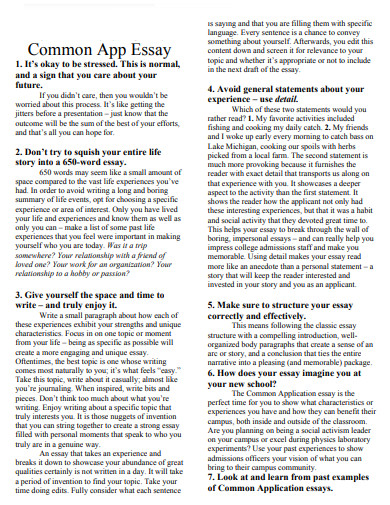
Size: 92 KB
2. Common Application Essay Prompts Template
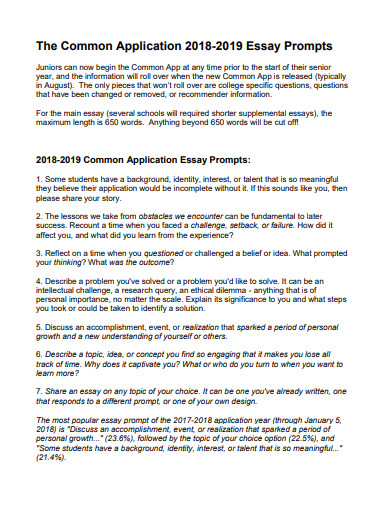
Size: 103 KB
3. Supplement to the Common Application Essay
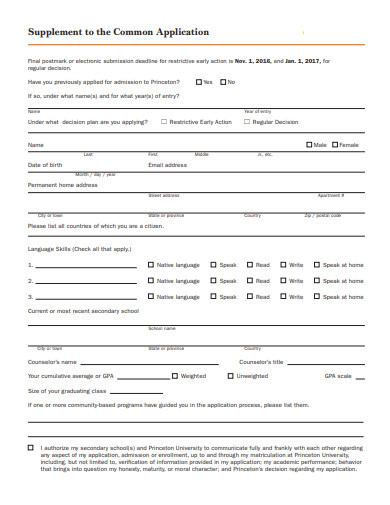
Size: 219 KB
4. Common App Essay Worksheet in PDF
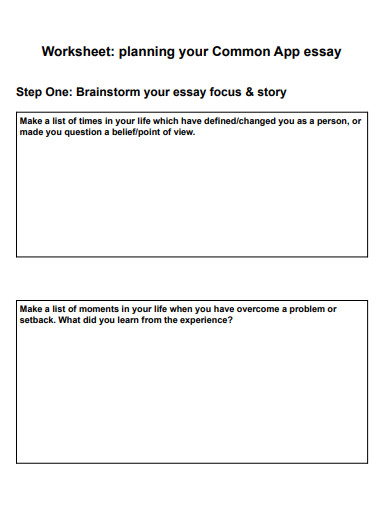
Size: 72 KB
5. Sample Common App Essay
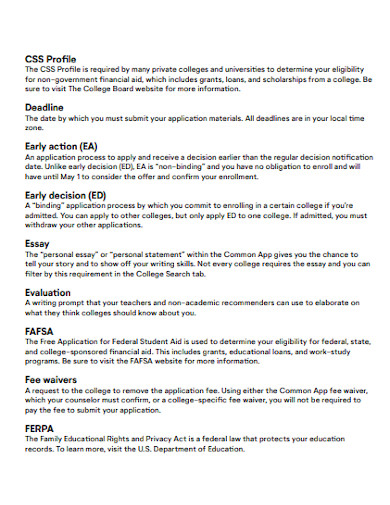
Size: 81 KB
6. Decoding the Common App Essay Prompts
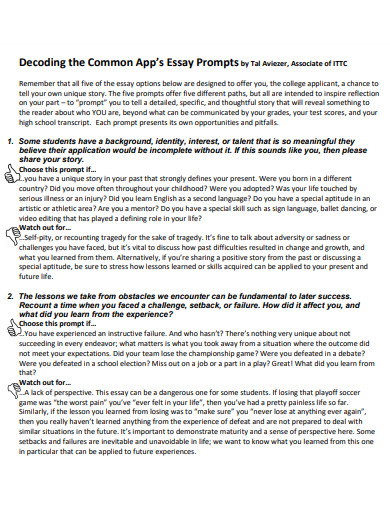
Size: 99 KB
7. Common Application Essay in DOC
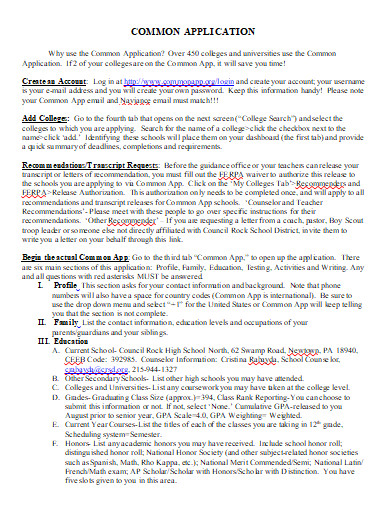
Size: 12 KB
What Is a Common Application Essay?
A common application essay also called an admission essay is an essay with a purpose. A written essay made by an applicant who is hoping to get the permission they are asking for. Application essays are mostly common with students who wish to be admitted to the school of their choice.
How to Make an Application Essay
Now you may want to ask yourself, is an application essay easy to compose? What goes in an application essay? How is it different from a personal statement ? Here are steps to guide you to making your application essay.
Step 1: Check the Instructions
Always make sure that you read the instructions to your application essay . Before you start writing your application essay, read the instructions. This is important because the instructions tell you what you should write, what to write and how many paragraphs you need to write.
Step 2: Draft Your Work
Drafting your work before writing the final piece would help you smooth out your ideas. It would also help you find what you are intending to write out. Drafting your work will also help you save a lot of time having to write and erase and write again.
Step 3: Stick to What Is Being Asked
If you are being asked to write an essay about you and why you want to be admitted to this school or university, that is where you begin. Avoid having to write something that is not true or not relevant to your essay. Too much flowery language would only make your essay confusing. Stick to general words.
Step 4: Proofread Your Essay
Let someone else proofread your essay. Let them see if your tone in your essay is professional or polite. If it so happens your essay lacks something, go back to the last tip and rewrite your essay if you have any spare time.
Why is an application essay needed?
Your application essay is a way for people to get to know you as the candidate. Your essay is your key to applying for college or for work. This is the school or the company’s way of seeing if you are what they are looking for or you are the student they need for their school.
What are the other types of essays?
The other types of essays are: descriptive essay , narrative essay, college essay , comparative essay , argumentative essay , persuasive essay , and many more.
Do I need to let someone proofread my essay?
Yes. It is best to let someone proofread your essay before sending it. This way you are able to see what you need to add and what you need to take out.
What skills do I need to add in my essay?
If they are asking for the skills you have based on a job, list the ones that are appropriate for the job you are applying for.
Application essays are sometimes taken for granted by students who find essay writing a gruesome task. But what they forget to remember is that it is still as important to know how to write one. Often than not, application essays are most commonly used by students applying for a scholarship, a course or even a school. These types of audiences would often look at how an applicant writes their essay. So it is always important to remember how to write an application essay. Because you may never know when you are going to need it.
Text prompt
- Instructive
- Professional
Write a Common App essay on a moment that significantly changed your perspective on life.
Describe in a Common App essay a challenge you've overcome and how it has shaped you.
Here’s How Ivy League Schools Evaluate Student GPAs
- Share to Facebook
- Share to Twitter
- Share to Linkedin
One of the main gates on the Brown University campus, decorated with the University crest. (Photo by ... [+] Rick Friedman/Corbis via Getty Images)
A stellar GPA is one of the building blocks of a successful Ivy League application, and as the school year winds down, many students are anxiously seeking to give theirs a final boost. While most students and families understand the importance of a 4.0, few are aware of how top colleges evaluate student GPAs or what they look for when reviewing student transcripts. Though your GPA may seem to be a simple metric, nothing could be further from the case—colleges consider more than just the number, accounting for complexities such as diverse grading systems across schools, trends in grade inflation, and level of course rigor.
Here are three important facts to keep in mind about your GPA as you choose your courses:
1. Your GPA doesn’t directly compare to that of students at other schools.
One common misconception among college applicants is that they can compare their GPAs with those of students attending different schools. However, the GPA is not a universal metric but rather a reflection of an individual's academic performance within their specific educational environment. As a result, comparing GPAs from different schools is like comparing apples and oranges. For instance, some schools offer a plethora of AP, IB, and honors courses, while others may have limited options or offer none at all. Additionally, the weight assigned to AP versus honors versus regular classes varies from school to school. So, your GPA may not hold the same weight as those of your peers at different schools, even if you all have 4.0s.
Admissions officers understand that schools vary in their rigor, curriculum, and grading policies. Therefore, they evaluate your GPA in the context of your high school, considering the courses offered and the academic challenges presented. Instead of fixating on how your GPA compares to your friends’ from other schools, focus on challenging yourself and taking advantage of all the opportunities available to you at your school.
2. GPAs across the country are inflated—and colleges know it.
The last few years have seen surges in high school student GPAs nationwide. While GPA inflation has been on the rise over the last decade, average ACT composite scores are steadily declining. “For the 1.4 million ACT test-takers in the high school class of 2023, the average composite score on the exam was 19.5 out of 36, the lowest score since 1991,” according to The New York Times . The parallel differences, coupled with academic differences across schools, suggest that GPA must be considered in tandem with multiple other factors. Simply put, an A no longer means what it used to on a transcript.
Samsung Issues Critical Update For Millions Of Galaxy Users
Drake kendrick lamar feud timeline another trespasser caught at drake s toronto home police say, the best queen mattresses that promote more restful nights.
Ivy League and other top colleges are well aware of this trend and evaluate student GPAs alongside other metrics such as standardized test scores and AP exam scores in order to better understand a student’s academic skill sets. While some Ivy League and other top schools remain test-optional , they still place emphasis on course rigor and the context offered by your high school profile in order to understand the grades on your transcript.
3. Colleges will recalculate your GPA.
Given the abundance of variables in GPA calculations, colleges often recalculate the metric to create a standardized baseline for comparison between students across different schools. The recalibration may involve adjusting for variations in grading scales or the weighting of honors, International Baccalaureate (IB) or Advanced Placement (AP) courses. The University of California system, for example, calculates students’ UC GPAs by converting grades to grade points (an A is equivalent to 4 points, a B to three points, etc.) for classes taken between summer after 9th and summer after 11th grade, and adding one point for each honors class, and dividing by total classes taken to yield final GPA.*
Other colleges also take additional factors that impact academic performance into consideration, and envelop GPA into a broader, holistic consideration. For instance, the Harvard University lawsuit over affirmative action revealed that Harvard rates students on a scale of 1–6 (with one being the most desirable) in academic, extracurricular, athletic and personal categories. A student’s GPA and test scores are folded together into an academic score which “summarizes the applicant’s academic achievement and potential based on grades, testing results, letters of recommendation, academic prizes, and any submitted academic work.”
This process aims to provide a fair and equitable evaluation of students from different educational backgrounds. Keep in mind that Harvard considers not only your grades, test scores, and academic rigor in this score, but also “evidence of substantial scholarship” and “academic creativity,” which can make the difference between a 1 and a 2 in the scoring system. These systems underscore the importance of taking advantage of every opportunity, showcasing your unique personality and creativity, and seeking to maximize opportunities to improve your performance within the academic landscape of your institution.
By understanding the complex way by which colleges evaluate students’ GPAs, you are better equipped to present a comprehensive and competitive picture of your academic achievements on your transcript and stand out in the competitive Ivy League admissions landscape.
*Variations exist for in-state versus out-of-state students and by high school. Be sure to calculate your GPA following the UC issued guidelines.

- Editorial Standards
- Reprints & Permissions
AskEasy: AI ChatBot Assistant 12+
Ask chat bot・your 24/7 helper, zilingial limited, designed for iphone.
- #47 in Productivity
- 4.7 • 18.6K Ratings
- Offers In-App Purchases
iPhone Screenshots
Description.
AskEasy: simplify your life with a smart assistant! Looking for a good recipe to surprise your guests? Need ideas for a birthday party? Or some help with writing an essay or composing a resume? Simply open the app and ask! AskEasy is a real lifesaver. It finds answers to any questions, generates texts and brainstorms ideas, helps with daily tasks, proofreads and improves your content, and even acts as a fun empathetic friend always open for a chat! All you need to do is just type in your request and see how an accurate answer magically appears on your screen! What sets this app apart are its four most powerful chat models: GPT 3.5, GPT 4, Llama 2, and Gemini. These cutting-edge AI technologies ensure that you can easily choose the model that best meets your specific needs, providing tailored, intelligent responses in real-time. Have questions about a YouTube video? Or need a short summary of a video instead of watching it whole? Now, you can simply paste the video link and ask away. Our chatbot will answer your questions based on the video content and provide a concise summary of it. Need to create unique visuals for your project? Go to Image Generator and get inspiring images generated by AI in seconds! All you have to do is just to type in the text description – and see how it magically transforms into images. Moreover, you can easily get creative captions, tags and stories based on your images by using the Text to Image tool. AI understands and interprets the context and emotions of your photos, and brings the ideas of creative texts that will enhance your social media presence. With """"Upload & Ask,"""" you have the power to directly upload a PDF document and effortlessly ask questions about its content. This feature deciphers the text, providing you with precise answers and insights without the need for manual searching or reading. Meanwhile, """"Ask by Link"""" offers an equally innovative capability where you can insert a link to a web page and receive answers derived from its content. Whether it's a detailed explanation, summary, or specific information, this feature ensures you get the answers you need quickly and efficiently. Your creativity is your only limit! Experiment with your queries to discover everything the chatbot can do for you, and you will be amazed by the mind-blowing results: - Choose the chat model (GPT 3.5, GPT 4, Llama 2, or Gemini) to solve your tasks quickly and efficiently - Write anything: from tweets, email responses, and ad copies to essays, poems, and creative stories - Brainstorm ideas: new recipes, movie and song recommendations, places to go, party ideas, etc. - Check and improve your writing - Simplify your texts by summarizing them - Insert a link to YouTube video and ask your questions based on it - Get quick and concise summary of a video on YouTube - Get AI-generated images from your word description - Transform any text into visually captivating quotes - Generate captivating captions, relevant tags, or stories for your pics - Create original jokes and holiday greetings - Translate texts into other languages or even into programmatic commands - Use it for analytics and business intelligence - Get prepared for an exam or job interview - Or simply check out your daily horoscope! Features: - Smart chat for iPhone - GPT 3.5, GPT 4, Llama 2, and Gemini support - Spell and grammar check - Images Generator - Quote Maker - Text for Image - “Ask by Link” and “Upload & Ask” features - Ask Youtube and Youtube Summary - Text writing and facts search - History of your queries - CV and social profile builder - Clear and smart design - Simple and blazingly fast to use Privacy Policy Url - https://mychat-ai.cloud/pp Term Of Use Url - https://mychat-ai.cloud/tou Support Address - [email protected]
Version 2.1
Why update the app that already works great? To get the most out of it, of course! The benefits of the new version: —Flawless bug-free experience —Improved user interface and app's navigation Your positive reviews in the App Store will inspire us to new achievements!
Ratings and Reviews
18.6K Ratings
Ok so I have a problem
The concept of having ai write you a story is amazing. The stories are amazing. But, what good is it if it doesn’t give an ending. It doesn’t have to be long to end well. But it leaves you hanging. Not a fan of that. Especially since I paid for it UPDATE: ok, so I changed most review from three stars to 5z mainly because regardless of if the story ends or not, I’m able to end it myself quite well. I enjoy the app and it helps me a lot in my work
Developer Response ,
Dear Juliabrown1966!!!!!Thank you for your feedback. We apologize for the inconvenience caused and we understand your frustration with the limitations you've encountered in the application. The application has certain restrictions in place due to server limitations and the significant computing resources required for advanced AI technology like GPT-4. These limitations are in place to ensure the app's performance and availability for all users. We have increased the limit of characters to the maximum allowed from GPT itself and we cannot go beyond it. Thank you for understanding. Warmest regards, AI ChatBot: Smart Assistant Support Team
Not as described
Right after installing presented programs not functioning, i didn’t get try all, with in two minutes was forced to rated with 5 stars if i was too quick to press buttons. I didn’t even get to read what was the gpt’s response to me but as it was typing things really fast noticed everything being typed was flickering like screen power is too low. Remember after 3 days i trial you will be charged automatically. This look good but just like most of them, taking a freeware altering in some cases not much from the original and start chasing the money with tricks and dancing around the truth with lies. I think today’s browsers gpt is good as most of these tricksters version unless you need a serious one for school or work then I suggest getting a real one pay a few more dollars than what these people are asking and have a real one, if that’s not the case stick with ones as browsers add on is my opinion.
Dear User! We are very grateful to you for taking the time to leave us a review. We consider a customer-centric approach and always put ourselves in our customer’s mind. That way, we can align the learning experience with their expectations and improve our application. We will definitely take into account the fact that the users need more time to evaluate the application and will not force them to rate the app too quickly. We have our users' best interests at heart and will continue to work tirelessly to better ourselves and our application. Best regards, AI ChatBot: Smart Assistant Support Team
Concern over longevity
I have tried numerous AI Assistants. And this one, by far, is my favorite. I even went so far as to opt in for paying for full features. However, as an assistant or even aid, it is limited and out dated. When querying about the up-to-date information it could provide me, my assistant informs me that it is only as up-to-date as 2021. So, I queried about when the databases may be updated. And there was no information on that. The databases are already years behind and this is concerning. I didn’t pay to have something that can’t actually do as it is alleged to be able to perform. I can google and get more current information.
Dear Crashed and Lost! Thank you for your feedback and for choosing our AI ChatBot as your favorite assistant. We apologize for any inconvenience caused by the limitations of the up-to-date information provided. We are constantly working on improving our databases and ensuring the latest information is available. But as we use the official open AI api and their system is based on data up to 2021, the assistant informs you that it is only as up-to-date as 2021. Best regards, AI ChatBot: Smart Assistant Support Team
App Privacy
The developer, Zilingial Limited , indicated that the app’s privacy practices may include handling of data as described below. For more information, see the developer’s privacy policy .
Data Used to Track You
The following data may be used to track you across apps and websites owned by other companies:
- Identifiers
Data Not Linked to You
The following data may be collected but it is not linked to your identity:
- Diagnostics
Privacy practices may vary, for example, based on the features you use or your age. Learn More
Information
English, French, German, Italian, Japanese, Korean, Portuguese, Simplified Chinese, Spanish, Traditional Chinese
- AI ChatBot: 1 Week Access $7.99
- AI ChatBot - 1 Week Access $7.99
- AI ChatBot: Access for 1 Year $49.99
- AI Chat Bot: Weekly Access $7.99
- AI ChatBot: 1 Week Access $4.99
- AI Assistant - 1 Month $19.99
- AI ChatBot for 1 Year $19.99
- AI Helper for 1 Week $4.99
- AI ChatBot: 1 Year Access $49.99
- Developer Website
- App Support
- Privacy Policy
More By This Developer
AI Wallpapers & Widgets - Flex

IMAGES
VIDEO
COMMENTS
Before you can write a good essay in Chinese, you must first be accustomed with Chinese characters. Unlike English letters, Chinese characters are hieroglyphs, and the individual strokes are different from each other. It is important to be comfortable with writing Chinese characters in order to write essays well in Chinese. Make sure to use ...
Here are tips to help you get better at writing essays in Chinese. Cover image from Pexels Learn New Chinese Words. The key to communicating in a new language is learning as many words as you can. Take it upon yourself to learn at least one Chinese word a day. Chinese words are to essay writing what bricks are to a building.
2. Determine the center, choose the right material. To conform to the fact that a typical, novel, so it's easy to attract the attention of people. 3. Make a good outline, determine the general, write enough words. 4. Sentence writing smooth, there is no wrong character, no wrong grammar in article. Emotion, it is very important.
Become familiar with the Chinese Character Writing. In order to write a good Chinese essay, a fundamental step is to be familiar with Chinese characters. Chinese characters are different when you compare them to English letters. Chinese characters are hieroglyphs and each stroke of a Chinese character is different from the next stroke ...
Chinese Essay Phrases Used in Abstracts. The abstract should explain the purpose, method, results, and conclusion of your research, also highlighting the new ideas that you proposed; and do remember to keep your language concise while writing. The purpose of the abstract is to conclude and summarize the main contents of your essay so that the ...
Avoid perfectionism and performance anxiety - Many people feel that their writing is not good enough or that the result needs to be perfect. This is because they think of it as a product, rather than a process. Don't wait for the perfect situation to write, the perfect topic, the perfect mood, and so on.
4" " ForChineseworks,usepinyinforauthor,title,journalname,publisher,andany"otherrelevant information. Use"italicsorcitation"marksasyouwould ...
Once you can write the answers to the above down on a single side of the paper, you are ready to tackle the main part of the problem: putting pen to paper. Set aside time to write. The chances are that you're not going to be able to pen the entire essay in a single sitting, and that's okay.
Tip 9: Keep a Word Bank. Start building a Chinese vocabulary word bank if you do not already have one. Collate the good phrases and idioms used by others. You can start noting down good phrases from the textbook and also from the comprehension passages you have completed.
Now, most Chinese movies have both Chinese subtitles and English subtitles, then watching movie become an interesting way to improve Chinese writing. In addition, a movie is a good way to get to know the life and manner of Chinese that can make your Chinese writing truthfulness. Tip 5: Keep Writing Every day. There's a Chinese saying ...
18. When analyzing Chinese speeches or essays, I often have difficulty understanding how their the authors organized their ideas. In North America, for example, a common template for writing an essay is the five-paragraph essay. This organizes the paragraphs and the sentences within each paragraph. Most English-language writing in academia ...
As a Chinese student, learning how to write an essay in this language is very important. Here are tips to help you get better at writing essays in Chinese. You can also enter a city, course or keyword to search, such as: Private Shanghai Location Online Beijing Shanghai
比方说 比如 例如. Use 'chengyus' (idioms). These are very commonly used in Chinese writing and will give your essay a sense of fluency and flair. Be careful to make sure you fully understand the meaning of the idiom and the context in which it can be used before using it in your work. Here are some useful 'chengyus' that can be used ...
Before we even talk about what to write, we must first know what will be tested. For GCE O level Chinese exam, essay writing is in section 2 of Paper 1. In this section, students are expected to choose to write 1 out of 3 questions, and the 3 questions will be in one of the following categories: 情景文 (Scenario essay writing) 说明文 ...
For example, "the sun was shining brightly" (adjective) and "the sun shone brightly" (adverb) convey different feelings in the same scene. 3. Practice writing mind maps. Use mind maps to organise thoughts and content, then use the ideas from the map to write your composition. For example, before writing about campus life, list points like the ...
So make sure that you really understand what each good phrase mean so that you can choose the most appropriate one to use for your writing. Being able to match the right phrase to the right situation is key to making your Chinese composition shine. 2. The more words and phrases in my compo, the merrier. Stuffing your Chinese composition with ...
10 Useful Words for Writing Essays in Mandarin Chinese 不但...,而且...: https://youtu.be/EJnKych4BvU
Creative Composition Writing - learning to write creatively, expressively and descriptively! grasp the important steps to writing a good essay, like constructing good sentences and paragraphs; Vocabulary Expansion- Increase your child's confidence in doing well for Chinese through mastery of the use of good phrases and words
When I studied Chinese years ago, I would sometimes type out 6-paragraph essays to myself about topics of interest or current events, or even about something that happened earlier in the day (say a disagreement with someone or something). It didn't matter if my grammar was off (that came with time, looking things up, and practice).
First we went from components to characters. Next, we are going from characters to words. Although there are a lot of one-character words in Chinese, they tend to either be classically-rooted words like "king" and "horse" or grammatical particles and pronouns. The vast majority of Chinese words contain two characters.
Harvard College Writing Center 5 Asking Analytical Questions When you write an essay for a course you are taking, you are being asked not only to create a product (the essay) but, more importantly, to go through a process of thinking more deeply about a question or problem related to the course. By writing about a
Step #3 Think and decide on the prologue. Simply put, the prologue is the image before the first image. A preface is like a starter. It opens up the patron's, in this case, the reader's, appetite and provides a hint of what's to come. Exceptionally accurate for picture composition, it's implausible to create a story with rationale and ...
Introduction. China, officially known as the People's Republic of China, is a country located in East Asia. It is the world's most populous country, boasting a population of over 1.4 billion. China's rich history, diverse culture, and rapid economic growth have made it a global powerhouse.
This is essentially a Chinese University Program Scholarship, where applicants can only apply to three universities. 3. CSC Program Type A. Type A scholarships are essentially non-university scholarships. Therefore, institutions other than Chinese universities responsible for recruiting students are required to check your eligibility.
Application essays are sometimes taken for granted by students who find essay writing a gruesome task. But what they forget to remember is that it is still as important to know how to write one. Often than not, application essays are most commonly used by students applying for a scholarship, a course or even a school.
Join us at 6 PM (WAT) this Thursday May 9, 2024, as our distinguish guest will be discussing the topic: GEN-Z ACCOUNTANTS: Redefining Traditional...
2. GPAs across the country are inflated—and colleges know it. The last few years have seen surges in high school student GPAs nationwide. While GPA inflation has been on the rise over the last ...
- Write anything: from tweets, email responses, and ad copies to essays, poems, and creative stories - Brainstorm ideas: new recipes, movie and song recommendations, places to go, party ideas, etc. - Check and improve your writing - Simplify your texts by summarizing them - Insert a link to YouTube video and ask your questions based on it